liberregxml/src/erregxml.c File Reference
liberreg - parse and destroy registry the functions of getting the functions of setting the functions of checking xpath exists or not More...
#include <stdio.h>
#include <stdlib.h>
#include <string.h>
#include <sys/stat.h>
#include <sys/types.h>
#include <unistd.h>
#include <glib.h>
#include "erreglog.h"
#include "erreg.h"
#include "erregtypes_f.h"
#include "erregrwlock.h"
#include "erregxml.h"
#include "system.h"
Go to the source code of this file.
Functions | |
| gboolean | regValidate (regRegistry_t *pRegistry) |
| static regRegistry_t * | regParseSingleFile (const char *szXmlFile, const char *szXsdFile) |
| regRegistry_t * | regParseFiles (const char *szXmlFile, const char *szXsdFile) |
| gboolean | regStore (regRegistry_t *pRegistry, const char *szPath) |
| void | regDestroy (regRegistry_t *pRegistry) |
| regVersion_t * | regGetVersion (const regRegistry_t *pRegistry) |
| gboolean | regSetVersion (const regVersion_t *theVersion, regRegistry_t *pRegistry) |
| regUserProfile_t * | regGetUserProfile (const regRegistry_t *pRegistry) |
| gboolean | regSetUserProfile (const regUserProfile_t *theUserProfile, regRegistry_t *pRegistry) |
| regUserSetting_t * | regGetUserSetting (const regRegistry_t *pRegistry) |
| gboolean | regSetUserSetting (const regUserSetting_t *theUserSetting, regRegistry_t *pRegistry) |
| regPCConfig_t * | regGetPCConfig (const regRegistry_t *pRegistry) |
| gboolean | regSetPCConfig (const regPCConfig_t *thePCConfig, regRegistry_t *pRegistry) |
| regPCProfile_t * | regGetPCProfile (const char *ID, const regRegistry_t *pRegistry) |
| gboolean | regSetPCProfile (const char *ID, const regPCProfile_t *thePCProfile, regRegistry_t *pRegistry) |
| gboolean | regRemovePCProfile (const char *ID, regRegistry_t *pRegistry) |
| gboolean | regRemovePCConfig (regRegistry_t *pRegistry) |
| void | regGetPCProfiles (regPCConfig_t **pPCConfig, regPCProfile_t ***pPCs, const regRegistry_t *pRegistry) |
| gboolean | regSetPCProfiles (const regPCConfig_t *thePCConfig, const regPCProfile_t **thePCs, regRegistry_t *pRegistry) |
| regAutoConnect_t * | regGetAutoConnect (const regRegistry_t *pRegistry) |
| gboolean | regSetAutoConnect (const regAutoConnect_t *theAutoConnect, regRegistry_t *pRegistry) |
| static int | lt (const void *l, const void *r) |
| static int | rmDup (int arr[], int *pSize) |
| regTimedIds_t * | regGetTimedIds (const regRegistry_t *pRegistry) |
| gboolean | regRemoveTimeSet (regRegistry_t *pRegistry) |
| gboolean | regSetTimedIds (regTimedIds_t *theTimedIds, regRegistry_t *pRegistry) |
| regContentCategory_t * | regGetContentCategory (const char *ID, const regRegistry_t *pRegistry) |
| gboolean | regSetContentCategory (const char *ID, const regContentCategory_t *theContentCategory, regRegistry_t *pRegistry) |
| regExportMemType_t * | regGetExportMemType (const regRegistry_t *pRegistry) |
| gboolean | regSetExportMemType (const regExportMemType_t *theExportMemType, regRegistry_t *pRegistry) |
| regLastRead_t * | regGetLastRead (const char *ID, regRegistry_t *pRegistry) |
| gboolean | regSetLastRead (const char *ID, const regLastRead_t *theLastRead, regRegistry_t *pRegistry) |
| regUserAppList_t * | regGetUserAppList (const regRegistry_t *pRegistry) |
| regUserApp_t * | regGetUserApp (const char *uaID, const regRegistry_t *pRegistry) |
| gboolean | regSetUserApp (const char *uaID, const regUserApp_t *theUserApp, regRegistry_t *pRegistry) |
| regExtInfoList_t * | regGetExtInfoList (const char *extension, const regRegistry_t *pRegistry) |
| This function will return an array of regExtInfo_t nodes. | |
| regStartUp_t * | regGetStartUp (const regRegistry_t *pRegistry) |
| gboolean | regSetStartUp (const regStartUp_t *theStartUp, regRegistry_t *pRegistry) |
| static gboolean | getProxySettings (const regRegistry_t *pRegistry, const char *curXpath, regProxySetting_t *proxySettings) |
| static gboolean | getIpSettings (const regRegistry_t *pRegistry, const char *curXpath, regIpSetting_t *ipSettings) |
| static gboolean | getWirelessSettings (const regRegistry_t *pRegistry, const char *curXpath, regWirelessSetting_t *wirelessSettings) |
| static gboolean | getDialupSettings (const regRegistry_t *pRegistry, const char *curXpath, regDialupSetting_t *dialupSettings) |
| static int | compare_profileID (const void *l, const void *r) |
| regNetworkConfig_t * | regGetNetworkConfig (const regRegistry_t *pRegistry) |
| gboolean | regSetNetworkConfig (const regNetworkConfig_t *theNetworkConfig, regRegistry_t *pRegistry) |
| regNetworkProfile_t * | regGetNetworkProfile (const char *ID, const regRegistry_t *pRegistry) |
| static gboolean | regChkNetworkProfile (const regNetworkProfile_t *theNetworkProfile) |
| static gboolean | setWirelessSettings (regRegistry_t *pRegistry, char *curXpath, regWirelessSetting_t *wirelessSettings) |
| static gboolean | setDialupSettings (regRegistry_t *pRegistry, char *curXpath, regDialupSetting_t *dialupSettings) |
| static gboolean | setProxySettings (regRegistry_t *pRegistry, char *curXpath, regProxySetting_t *proxySettings) |
| static gboolean | setIpSettings (regRegistry_t *pRegistry, char *curXpath, regIpSetting_t *ipSettings) |
| gboolean | regSetNetworkProfile (const char *ID, const regNetworkProfile_t *theNetworkProfile, regRegistry_t *pRegistry) |
| gboolean | regRemoveNetworkProfile (const char *ID, regRegistry_t *pRegistry) |
| gboolean | regRemoveNetworkConfig (regRegistry_t *pRegistry) |
| void | regGetNetworkProfiles (regNetworkConfig_t **pNetworkConfig, regNetworkProfile_t ***pNetworks, const regRegistry_t *pRegistry) |
| gboolean | regSetNetworkProfiles (const regNetworkConfig_t *theNetworkConfig, const regNetworkProfile_t **theNetworks, regRegistry_t *pRegistry) |
| regLastConnect_t * | regGetLastConnect (const regRegistry_t *pRegistry) |
| gboolean | regSetLastConnect (const regLastConnect_t *theLastConnect, regRegistry_t *pRegistry) |
| gboolean | regGetAutoConnectWlan (const regRegistry_t *pRegistry) |
| gboolean | regSetAutoConnectWlan (gboolean enable, regRegistry_t *pRegistry) |
| regIconSet_t * | regGetIconSet (const regRegistry_t *pRegistry) |
| deviceDetails_t * | regGetDeviceDetails (const regRegistry_t *pRegistry) |
| gboolean | regSetDeviceDetails (const deviceDetails_t *theDeviceDetails, regRegistry_t *pRegistry) |
Detailed Description
liberreg - parse and destroy registry the functions of getting the functions of setting the functions of checking xpath exists or notCopyright (C) 2007 iRex Technologies B.V. All rights reserved.
Definition in file erregxml.c.
Function Documentation
| static int compare_profileID | ( | const void * | l, | |
| const void * | r | |||
| ) | [static] |
Definition at line 2471 of file erregxml.c.
02472 { 02473 const char* left = *((char**) l); 02474 const char* right = *((char**) r); 02475 02476 g_assert(left); 02477 g_assert(right); 02478 02479 ERREG_LOGPRINTF("entry: left [%s] right [%s]", left, right); 02480 02481 if ( strncmp(left, "NW_", 3) == 0 02482 && strncmp(right, "NW_", 3) == 0) 02483 { 02484 return (atoi(left+3) - atoi(right+3)); 02485 } 02486 else 02487 { 02488 return strcmp(left, right); 02489 } 02490 }
| static gboolean getDialupSettings | ( | const regRegistry_t * | pRegistry, | |
| const char * | curXpath, | |||
| regDialupSetting_t * | dialupSettings | |||
| ) | [static] |
Definition at line 2427 of file erregxml.c.
02430 { 02431 ERREG_LOGPRINTF("entry %p %s %p", pRegistry, curXpath, dialupSettings); 02432 g_assert(pRegistry); 02433 g_assert(curXpath); 02434 g_assert(dialupSettings); 02435 02436 char xpath[BUF_LEN + 1], szTmp[BUF_LEN + 1]; 02437 int nLen, nRet; 02438 02439 const erManifest *pXmlCxt = &(pRegistry->xmlCxt); 02440 02441 // phone 02442 nLen = g_snprintf(xpath, BUF_LEN, "%s/%s/%s", curXpath, EL_DIALUP_DETAILS, EL_DIALUP_PHONE); 02443 nRet = ermXmlGetString(pXmlCxt, xpath, szTmp, BUF_LEN); 02444 if (RET_ERR == nRet) 02445 { 02446 return FALSE; 02447 } 02448 dialupSettings->phone = g_strdup(szTmp); 02449 02450 // user 02451 nLen = g_snprintf(xpath, BUF_LEN, "%s/%s/%s", curXpath, EL_DIALUP_DETAILS, EL_DIALUP_USER); 02452 nRet = ermXmlGetString(pXmlCxt, xpath, szTmp, BUF_LEN); 02453 if (RET_ERR == nRet) 02454 { 02455 return FALSE; 02456 } 02457 dialupSettings->user = g_strdup(szTmp); 02458 02459 // password 02460 nLen = g_snprintf(xpath, BUF_LEN, "%s/%s/%s", curXpath, EL_DIALUP_DETAILS, EL_DIALUP_PASSWORD); 02461 nRet = ermXmlGetString(pXmlCxt, xpath, szTmp, BUF_LEN); 02462 if (RET_ERR == nRet) 02463 { 02464 return FALSE; 02465 } 02466 dialupSettings->password = g_strdup(szTmp); 02467 02468 return TRUE; 02469 }

| static gboolean getIpSettings | ( | const regRegistry_t * | pRegistry, | |
| const char * | curXpath, | |||
| regIpSetting_t * | ipSettings | |||
| ) | [static] |
Definition at line 2320 of file erregxml.c.
02321 { 02322 ERREG_LOGPRINTF("entry %p %s %p", pRegistry, curXpath, ipSettings); 02323 g_assert(pRegistry); 02324 g_assert(curXpath); 02325 g_assert(ipSettings); 02326 02327 char xpath[BUF_LEN + 1], szTmp[BUF_LEN + 1]; 02328 int nLen, nRet; 02329 02330 const erManifest *pXmlCxt = &(pRegistry->xmlCxt); 02331 02332 // ipaddress 02333 nLen = g_snprintf(xpath, BUF_LEN, "%s/%s/%s", curXpath, EL_IP_STATIC_DETAILS, EL_IP_ADDRESS); 02334 nRet = ermXmlGetString(pXmlCxt, xpath, szTmp, BUF_LEN); 02335 if (RET_ERR == nRet) 02336 { 02337 return FALSE; 02338 } 02339 ipSettings->address = g_strdup(szTmp); 02340 02341 // netmask 02342 nLen = g_snprintf(xpath, BUF_LEN, "%s/%s/%s", curXpath, EL_IP_STATIC_DETAILS, EL_IP_NETMASK); 02343 nRet = ermXmlGetString(pXmlCxt, xpath, szTmp, BUF_LEN); 02344 if (RET_ERR == nRet) 02345 { 02346 return FALSE; 02347 } 02348 ipSettings->netmask = g_strdup(szTmp); 02349 02350 // dns 02351 nLen = g_snprintf(xpath, BUF_LEN, "%s/%s/%s", curXpath, EL_IP_STATIC_DETAILS, EL_IP_DNS); 02352 nRet = ermXmlGetString(pXmlCxt, xpath, szTmp, BUF_LEN); 02353 if (RET_ERR == nRet) 02354 { 02355 return FALSE; 02356 } 02357 ipSettings->dns = g_strdup(szTmp); 02358 02359 // gateway 02360 nLen = g_snprintf(xpath, BUF_LEN, "%s/%s/%s", curXpath, EL_IP_STATIC_DETAILS, EL_IP_GATEWAY); 02361 nRet = ermXmlGetString(pXmlCxt, xpath, szTmp, BUF_LEN); 02362 if (RET_ERR == nRet) 02363 { 02364 return FALSE; 02365 } 02366 ipSettings->gateway = g_strdup(szTmp); 02367 02368 return TRUE; 02369 }

| static gboolean getProxySettings | ( | const regRegistry_t * | pRegistry, | |
| const char * | curXpath, | |||
| regProxySetting_t * | proxySettings | |||
| ) | [static] |
Definition at line 2287 of file erregxml.c.
02288 { 02289 ERREG_LOGPRINTF("entry %p, %s, %p", pRegistry, curXpath, proxySettings); 02290 g_assert(pRegistry); 02291 g_assert(curXpath); 02292 g_assert(proxySettings); 02293 02294 char xpath[BUF_LEN + 1], szTmp[BUF_LEN + 1]; 02295 int nLen, nPort, nRet; 02296 02297 const erManifest *pXmlCxt = &(pRegistry->xmlCxt); 02298 02299 // proxyserver 02300 nLen = g_snprintf(xpath, BUF_LEN, "%s/%s/%s", curXpath, EL_PROXY_DETAILS, EL_PROXY_SERVER); 02301 nRet = ermXmlGetString(pXmlCxt, xpath, szTmp, BUF_LEN); 02302 if (RET_ERR == nRet) 02303 { 02304 return FALSE; 02305 } 02306 proxySettings->address = g_strdup(szTmp); 02307 02308 // proxyport 02309 nLen = g_snprintf(xpath, BUF_LEN, "%s/%s/%s", curXpath, EL_PROXY_DETAILS, EL_PROXY_PORT); 02310 nRet = ermXmlGetInt(pXmlCxt, xpath, &nPort); 02311 if (RET_ERR == nRet) 02312 { 02313 return FALSE; 02314 } 02315 proxySettings->port = g_strdup_printf("%d", nPort); 02316 02317 return TRUE; 02318 }

| static gboolean getWirelessSettings | ( | const regRegistry_t * | pRegistry, | |
| const char * | curXpath, | |||
| regWirelessSetting_t * | wirelessSettings | |||
| ) | [static] |
Definition at line 2371 of file erregxml.c.
02374 { 02375 ERREG_LOGPRINTF("entry %p %s %p", pRegistry, curXpath, wirelessSettings); 02376 g_assert(pRegistry); 02377 g_assert(curXpath); 02378 g_assert(wirelessSettings); 02379 02380 char xpath[BUF_LEN + 1], szTmp[BUF_LEN + 1]; 02381 int nLen, nRet; 02382 02383 const erManifest *pXmlCxt = &(pRegistry->xmlCxt); 02384 02385 // ssid 02386 nLen = g_snprintf(xpath, BUF_LEN, "%s/%s/%s", curXpath, EL_WLAN_DETAILS, EL_WLAN_SSID); 02387 nRet = ermXmlGetString(pXmlCxt, xpath, szTmp, BUF_LEN); 02388 if (RET_ERR == nRet) 02389 { 02390 return FALSE; 02391 } 02392 wirelessSettings->SSID = g_strdup(szTmp); 02393 02394 // encryption_type_t 02395 nLen = g_snprintf(xpath, BUF_LEN, "%s/%s/%s", curXpath, EL_WLAN_DETAILS, EL_WLAN_ENCRYPTION_TYPE); 02396 nRet = ermXmlGetString(pXmlCxt, xpath, szTmp, BUF_LEN); 02397 if (RET_ERR == nRet) 02398 { 02399 return FALSE; 02400 } 02401 wirelessSettings->encrType = regWlanEncrToEnum(szTmp); 02402 02403 // encrKey 02404 if (wirelessSettings->encrType == encr_wep_t || wirelessSettings->encrType == encr_wpa_t) 02405 { 02406 nLen = g_snprintf(xpath, BUF_LEN, "%s/%s/%s", curXpath, EL_WLAN_DETAILS, EL_WLAN_ENCRYPTION_KEY); 02407 nRet = ermXmlGetString(pXmlCxt, xpath, szTmp, BUF_LEN); 02408 if (RET_ERR == nRet) 02409 { 02410 return FALSE; 02411 } 02412 wirelessSettings->encrKey = g_strdup(szTmp); 02413 } 02414 02415 // wlan broadcast 02416 nLen = g_snprintf(xpath, BUF_LEN, "%s/%s/%s", curXpath, EL_WLAN_DETAILS, EL_WLAN_BROADCAST); 02417 nRet = ermXmlGetBoolean(pXmlCxt, xpath, &wirelessSettings->broadcast); 02418 if (RET_ERR == nRet) 02419 { 02420 // because this element is optional, don't treat it as a error 02421 wirelessSettings->broadcast = TRUE; 02422 } 02423 02424 return TRUE; 02425 }
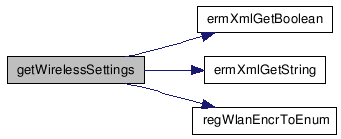
| static int lt | ( | const void * | l, | |
| const void * | r | |||
| ) | [static] |
| static gboolean regChkNetworkProfile | ( | const regNetworkProfile_t * | theNetworkProfile | ) | [static] |
Definition at line 2711 of file erregxml.c.
02712 { 02713 ERREG_LOGPRINTF("entry %p", theNetworkProfile); 02714 g_assert(theNetworkProfile); 02715 02716 if (theNetworkProfile->addressMode == static_t) 02717 { 02718 if (theNetworkProfile->ipSettings) 02719 { 02720 if ((theNetworkProfile->ipSettings->address == NULL) 02721 || (theNetworkProfile->ipSettings->netmask == NULL) 02722 || (theNetworkProfile->ipSettings->dns == NULL) 02723 || (theNetworkProfile->ipSettings->gateway == NULL)) 02724 { 02725 ERREG_WARNPRINTF("theNetworkProfile->ipSettings contains NULL"); 02726 return FALSE; 02727 } 02728 } 02729 else 02730 { 02731 ERREG_WARNPRINTF("theNetworkProfile->ipSettings == NULL while address mode static_t"); 02732 return FALSE; 02733 } 02734 } 02735 02736 if (theNetworkProfile->proxy == TRUE) 02737 { 02738 if (theNetworkProfile->proxySettings) 02739 { 02740 if ((theNetworkProfile->proxySettings->address == NULL) 02741 || (theNetworkProfile->proxySettings->port == NULL)) 02742 { 02743 ERREG_WARNPRINTF("theNetworkProfile->proxySettings contains NULL"); 02744 return FALSE; 02745 } 02746 } 02747 else 02748 { 02749 ERREG_WARNPRINTF("theNetworkProfile->proxySettings == NULL while proxy == TRUE"); 02750 return FALSE; 02751 } 02752 } 02753 02754 if (theNetworkProfile->connection == wireless_t) 02755 { 02756 if (theNetworkProfile->wirelessSettings) 02757 { 02758 switch (theNetworkProfile->wirelessSettings->encrType) 02759 { 02760 case encr_none_t: 02761 break; 02762 case encr_wep_t: 02763 case encr_wpa_t: 02764 if (theNetworkProfile->wirelessSettings->encrKey == NULL 02765 /* || theNetworkProfile->wirelessSettings->encrKey[0] == '\0' */) 02766 { 02767 ERREG_WARNPRINTF("theNetworkProfile->wirelessSettings->encrKey missing"); 02768 return FALSE; 02769 } 02770 break; 02771 default: 02772 ERREG_WARNPRINTF 02773 ("theNetworkProfile->wirelessSettings->encrType illegal value [%d]", 02774 theNetworkProfile->wirelessSettings->encrType); 02775 return FALSE; 02776 } 02777 } 02778 else 02779 { 02780 ERREG_WARNPRINTF("theNetworkProfile->wirelessSettings == NULL while connection == wireless_t "); 02781 return FALSE; 02782 } 02783 } 02784 02785 return TRUE; 02786 }
| void regDestroy | ( | regRegistry_t * | pRegistry | ) |
Definition at line 239 of file erregxml.c.
00240 { 00241 ERREG_LOGPRINTF("entry"); 00242 g_assert(pRegistry); 00243 00244 ermXmlClose(&(pRegistry->xmlCxt)); 00245 xsdUnload(&(pRegistry->xsdCxt)); 00246 g_free(pRegistry); 00247 }

| regAutoConnect_t* regGetAutoConnect | ( | const regRegistry_t * | pRegistry | ) |
Definition at line 1126 of file erregxml.c.
01127 { 01128 regAutoConnect_t *theAutoConnect = NULL; 01129 01130 ERREG_LOGPRINTF("entry %p", pRegistry); 01131 g_assert(pRegistry); 01132 g_assert(pRegistry->xpaths); 01133 g_assert(pRegistry->xpaths->autoConnect); 01134 01135 char xpath[BUF_LEN + 1], szTmp[BUF_LEN + 1]; 01136 int nLen, nRet; 01137 01138 const erManifest *pXmlCxt = &(pRegistry->xmlCxt); 01139 01140 theAutoConnect = g_new0(regAutoConnect_t, 1); 01141 g_assert(theAutoConnect != NULL); 01142 01143 // connect to which server 01144 nLen = g_snprintf(xpath, BUF_LEN, "%s/%s", pRegistry->xpaths->autoConnect, EL_SERVER_TYPE); 01145 nRet = ermXmlGetString(pXmlCxt, xpath, szTmp, BUF_LEN); 01146 if (RET_ERR == nRet) 01147 { 01148 ERREG_ERRORPRINTF("Can't get which server to connect from memory."); 01149 regFreeAutoConnect(theAutoConnect); 01150 theAutoConnect = NULL; 01151 return NULL; 01152 } 01153 theAutoConnect->backgroundConnectTo = regServerTypeToEnum(szTmp); 01154 01155 // background enable? 01156 nLen = g_snprintf(xpath, BUF_LEN, "%s/%s/%s", pRegistry->xpaths->autoConnect, EL_BACKGOUND, EL_ENABLE); 01157 nRet = ermXmlGetBoolean(pXmlCxt, xpath, &theAutoConnect->backgroundEnable); 01158 if (RET_ERR == nRet) 01159 { 01160 ERREG_ERRORPRINTF("Can't get background enable flag from memory."); 01161 regFreeAutoConnect(theAutoConnect); 01162 theAutoConnect = NULL; 01163 return NULL; 01164 } 01165 01166 // background interval 01167 nLen = g_snprintf(xpath, BUF_LEN, "%s/%s/%s", pRegistry->xpaths->autoConnect, EL_BACKGOUND, EL_INTERVAL); 01168 nRet = ermXmlGetInt(pXmlCxt, xpath, &theAutoConnect->backgroundInterval); 01169 if (RET_ERR == nRet) 01170 { 01171 ERREG_ERRORPRINTF("Can't get background interval from memory."); 01172 regFreeAutoConnect(theAutoConnect); 01173 theAutoConnect = NULL; 01174 return NULL; 01175 } 01176 01177 regDumpAutoConnect(theAutoConnect); 01178 return theAutoConnect; 01179 }
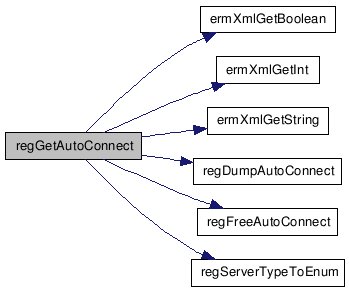
| gboolean regGetAutoConnectWlan | ( | const regRegistry_t * | pRegistry | ) |
Definition at line 3368 of file erregxml.c.
03369 { 03370 ERREG_LOGPRINTF("entry"); 03371 g_assert(pRegistry); 03372 g_assert(pRegistry->xpaths); 03373 g_assert(pRegistry->xpaths->autoConnectWlan); 03374 03375 gboolean enable = TRUE; 03376 const erManifest *pXmlCxt = &(pRegistry->xmlCxt); 03377 char* xpath = pRegistry->xpaths->autoConnectWlan; 03378 int nRet = ermXmlGetBoolean(pXmlCxt, xpath, &enable); 03379 03380 if (RET_ERR == nRet) 03381 { 03382 ERREG_ERRORPRINTF("Can't get the settings %s", xpath); 03383 } 03384 03385 regDumpAutoConnectWlan(enable); 03386 return enable; 03387 }

| regContentCategory_t* regGetContentCategory | ( | const char * | ID, | |
| const regRegistry_t * | pRegistry | |||
| ) |
Definition at line 1438 of file erregxml.c.
01439 { 01440 regContentCategory_t *theContentCategory = NULL; 01441 01442 ERREG_LOGPRINTF("entry: ID [%s] pRegistry [%p]", ID, pRegistry); 01443 g_assert(ID); 01444 g_assert(pRegistry); 01445 g_assert(pRegistry->xpaths); 01446 g_assert(pRegistry->xpaths->category); 01447 01448 char xpath[BUF_LEN + 1], szTmp[BUF_LEN + 1], xpathExt[BUF_LEN + 1]; 01449 int nLen, nRet; 01450 01451 const erManifest *pXmlCxt = &(pRegistry->xmlCxt); 01452 01453 theContentCategory = g_new0(regContentCategory_t, 1); 01454 g_assert(theContentCategory != NULL); 01455 01456 nLen = g_snprintf(xpath, BUF_LEN, "%s[@%s=\"%s\"]", pRegistry->xpaths->category, ATTR_TYPE, ID); 01457 01458 // location 01459 nLen = g_snprintf(xpathExt, BUF_LEN, "%s/%s", xpath, EL_LOCATION); 01460 nRet = ermXmlGetString(pXmlCxt, xpathExt, szTmp, BUF_LEN); 01461 if (RET_ERR == nRet) 01462 { 01463 ERREG_ERRORPRINTF("Can't get category from memory, xpath [%s]", xpath); 01464 regFreeContentCategory(theContentCategory); 01465 theContentCategory = NULL; 01466 return NULL; 01467 } 01468 theContentCategory->location = g_strdup(szTmp); 01469 01470 // sort 01471 nLen = g_snprintf(xpathExt, BUF_LEN, "%s/%s/%s", xpath, EL_SORT, EL_SORT_ASCENDING); 01472 nRet = ermXmlGetBoolean(pXmlCxt, xpathExt, &theContentCategory->sortAscending); 01473 if (RET_ERR == nRet) 01474 { 01475 ERREG_ERRORPRINTF("Can't get sort from memory, xpath [%s]", xpath); 01476 regFreeContentCategory(theContentCategory); 01477 theContentCategory = NULL; 01478 return NULL; 01479 } 01480 01481 nLen = g_snprintf(xpathExt, BUF_LEN, "%s/%s/%s", xpath, EL_SORT, EL_SORT_FIELD_TYPE); 01482 nRet = ermXmlGetString(pXmlCxt, xpathExt, szTmp, BUF_LEN); 01483 if (RET_ERR == nRet) 01484 { 01485 ERREG_ERRORPRINTF("Can't get sort field from memory, xpath [%s]", xpath); 01486 regFreeContentCategory(theContentCategory); 01487 theContentCategory = NULL; 01488 return NULL; 01489 } 01490 theContentCategory->sortFieldType = g_strdup(szTmp); 01491 01492 regDumpContentCategory(ID, theContentCategory); 01493 ERREG_LOGPRINTF("leave: theContentCategory [%p]", theContentCategory); 01494 return theContentCategory; 01495 }
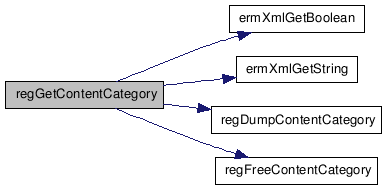
| deviceDetails_t* regGetDeviceDetails | ( | const regRegistry_t * | pRegistry | ) |
Definition at line 3505 of file erregxml.c.
03506 { 03507 deviceDetails_t *theDeviceDetails = NULL; 03508 03509 ERREG_LOGPRINTF("entry %p", pRegistry); 03510 g_assert(pRegistry); 03511 g_assert(pRegistry->xpaths); 03512 03513 char* cp = NULL; 03514 03515 // memory malloc 03516 theDeviceDetails = g_new0(deviceDetails_t, 1); 03517 g_assert(theDeviceDetails != NULL); 03518 03519 theDeviceDetails->software = g_new0(software_t, 1); 03520 g_assert(theDeviceDetails->software); 03521 03522 // build name 03523 theDeviceDetails->software->szBuildName = g_strdup(get_software_version_commercial()); 03524 03525 // build number 03526 theDeviceDetails->software->szBuildNum = g_strdup(get_software_version()); 03527 03528 // mac address of wireless 03529 // theDeviceDetails->szMacOfWireless = g_strdup(get_wireless_macAddress()); 03530 theDeviceDetails->szMacOfWireless = g_strdup(get_wlanmactxt_macAddress()); 03531 03532 // mac address of wired 03533 // theDeviceDetails->szMacOfWired = g_strdup(get_wired_macAddress()); 03534 theDeviceDetails->szMacOfWired = g_strdup(get_sysset_macAddress()); 03535 03536 // public key 03537 if (get_public_key(&cp) <= 0) 03538 { 03539 theDeviceDetails->szPublicKey = g_strdup(""); 03540 } 03541 else 03542 { 03543 theDeviceDetails->szPublicKey = cp; 03544 } 03545 03546 regDumpDeviceDetails(theDeviceDetails); 03547 return theDeviceDetails; 03548 }

| regExportMemType_t* regGetExportMemType | ( | const regRegistry_t * | pRegistry | ) |
Definition at line 1558 of file erregxml.c.
01559 { 01560 regExportMemType_t *theExportMemType = NULL; 01561 01562 ERREG_LOGPRINTF("entry %p", pRegistry); 01563 g_assert(pRegistry); 01564 g_assert(pRegistry->xpaths); 01565 g_assert(pRegistry->xpaths->usbExport); 01566 01567 char szTmp[BUF_LEN + 1]; 01568 int nRet; 01569 01570 const erManifest *pXmlCxt = &(pRegistry->xmlCxt); 01571 01572 theExportMemType = g_new0(regExportMemType_t, 1); 01573 g_assert(theExportMemType != NULL); 01574 01575 // Get the memory type which will be exported to user via USB connection 01576 nRet = ermXmlGetString(pXmlCxt, pRegistry->xpaths->usbExport, szTmp, BUF_LEN); 01577 if (nRet == RET_ERR) 01578 { 01579 regFreeExportMemType(theExportMemType); 01580 return NULL; 01581 } 01582 01583 theExportMemType->location = g_strdup(szTmp); 01584 return theExportMemType; 01585 }

| regExtInfoList_t* regGetExtInfoList | ( | const char * | extension, | |
| const regRegistry_t * | pRegistry | |||
| ) |
This function will return an array of regExtInfo_t nodes.
- Parameters:
-
extension The extension name. If NULL it will return all extention info, otherwise only return the nodes with the same extension name. pRegistry The registry handle.
- Returns:
- It returns NULL if something wrong. Otherwise it will return the an array of regExtInfo_t.
Definition at line 2039 of file erregxml.c.
02040 { 02041 regExtInfoList_t *theExtInfoList = NULL; 02042 xmlXPathObjectPtr xpathObj = NULL; 02043 xmlNodePtr* p_node = NULL; 02044 xmlNodeSetPtr extensionNodes = NULL; // list of extensionInfo nodes 02045 02046 02047 ERREG_LOGPRINTF("entry %p", pRegistry); 02048 g_assert(pRegistry); 02049 g_assert(pRegistry->xpaths); 02050 g_assert(pRegistry->xpaths->extensionInfos); 02051 02052 const erManifest *pXmlCxt = &(pRegistry->xmlCxt); 02053 02054 // get extensionInfos node by the extension name. 02055 char xpath[BUF_LEN + 1] = {0}; 02056 if (extension) 02057 { 02058 g_snprintf(xpath, BUF_LEN, "%s/%s[%s=\"%s\"]", 02059 pRegistry->xpaths->extensionInfos, 02060 EL_EXTENSION_INFO, 02061 EL_EXT_NAME, 02062 extension); 02063 } 02064 else 02065 { 02066 g_snprintf(xpath, BUF_LEN, "%s/%s", 02067 pRegistry->xpaths->extensionInfos, 02068 EL_EXTENSION_INFO); 02069 } 02070 xpathObj = ermXmlSelectNodes(pXmlCxt, xpath); 02071 if (xpathObj == NULL) 02072 { 02073 ERREG_WARNPRINTF("%s not found", xpath); 02074 return NULL; 02075 } 02076 02077 // get extensionInfo nodes 02078 extensionNodes = xpathObj->nodesetval; 02079 02080 // number and nodes 02081 int num = extensionNodes->nodeNr; 02082 p_node = extensionNodes->nodeTab; 02083 02084 // allocate the list 02085 theExtInfoList = g_new0(regExtInfoList_t, 1); 02086 g_assert(theExtInfoList != NULL); 02087 theExtInfoList->extArray = g_new0(regExtInfo_t, num); 02088 theExtInfoList->extArraySize = num; 02089 02090 // Walk all nodes and get the extensionInfo from it 02091 int i = 0; 02092 for (; i < num ; ++i, ++p_node) 02093 { 02094 xmlChar * content = 0; 02095 02096 // it's better to use libxml API instead of xpath here. 02097 // extIcon 02098 xmlNodePtr iconPtr = ermXmlGetChildNode(*p_node, EL_EXT_ICON); 02099 content = xmlNodeGetContent(iconPtr); 02100 theExtInfoList->extArray[i].iconLocation = g_strdup(content); 02101 xmlFree(content); 02102 02103 // extension name 02104 xmlNodePtr extPtr = ermXmlGetChildNode(*p_node, EL_EXT_NAME); 02105 content = xmlNodeGetContent(extPtr); 02106 theExtInfoList->extArray[i].extName = g_strdup(content); 02107 xmlFree(content); 02108 02109 // associate application 02110 xmlNodePtr appPtr = ermXmlGetChildNode(*p_node, EL_ASSOCIATE_APP); 02111 content = xmlNodeGetContent(appPtr); 02112 theExtInfoList->extArray[i].associateApp = g_strdup(content); 02113 xmlFree(content); 02114 02115 // associate order 02116 xmlNodePtr appOrderPtr = ermXmlGetChildNode(*p_node, EL_ASSOCIATE_ORDER); 02117 content = xmlNodeGetContent(appOrderPtr); 02118 int order = 1; 02119 if (content) 02120 { 02121 sscanf(content, "%d", &order); 02122 } 02123 theExtInfoList->extArray[i].associateOrder = order; 02124 } 02125 regDumpExtInfoList(theExtInfoList); 02126 02127 xmlXPathFreeObject(xpathObj); 02128 xpathObj = NULL; 02129 02130 return theExtInfoList; 02131 }

| regIconSet_t* regGetIconSet | ( | const regRegistry_t * | pRegistry | ) |
Definition at line 3419 of file erregxml.c.
03420 { 03421 regIconSet_t *theRegIconSet = NULL; 03422 03423 ERREG_LOGPRINTF("entry %p", pRegistry); 03424 g_assert(pRegistry); 03425 g_assert(pRegistry->xpaths); 03426 g_assert(pRegistry->xpaths->toolbarIcons); 03427 g_assert(pRegistry->xpaths->toolbarIcon); 03428 03429 char xpath[BUF_LEN + 1], szTmp[BUF_LEN + 1], szBase[BUF_LEN + 1]; 03430 int nLen, nIcons, nFiles, i, j, nRet; 03431 03432 const erManifest *pXmlCxt = &(pRegistry->xmlCxt); 03433 03434 // get the number of Nodes('toolbarIcon') 03435 nLen = g_snprintf(xpath, BUF_LEN, "%s", pRegistry->xpaths->toolbarIcon); 03436 nRet = ermXmlGetNodeNr(pXmlCxt, xpath, &nIcons); 03437 if (RET_ERR == nRet || 0 == nIcons) 03438 { 03439 ERREG_ERRORPRINTF("%s not present", xpath); 03440 return NULL; 03441 } 03442 03443 // get the string of node('iconBasePath') 03444 nLen = g_snprintf(xpath, BUF_LEN, "%s/%s", pRegistry->xpaths->toolbarIcons, EL_ICON_BASE_PATH); 03445 nRet = ermXmlGetString(pXmlCxt, xpath, szBase, BUF_LEN); 03446 if (RET_ERR == nRet) 03447 { 03448 ERREG_ERRORPRINTF("%s not present", xpath); 03449 return NULL; 03450 } 03451 03452 // memory malloc according to the 'nIcons' 03453 theRegIconSet = g_new0(regIconSet_t, 1); 03454 theRegIconSet->iconArray = g_new0(regIcon_t, nIcons); 03455 theRegIconSet->nIcons = nIcons; 03456 03457 // walk through and get 'toolbarIcon[i]' 03458 for (i = 1; i <= nIcons; i++) 03459 { 03460 // get the name of node('toolbarIcon[i]') 03461 nLen = g_snprintf(xpath, BUF_LEN, "%s[%d]", pRegistry->xpaths->toolbarIcon, i); 03462 nRet = ermXmlGetAttributeString(pXmlCxt, xpath, ATTR_NAME, szTmp, BUF_LEN); 03463 if (RET_OK == nRet) 03464 { 03465 theRegIconSet->iconArray[i - 1].iconName = g_strdup(szTmp); 03466 03467 // get the number of node('iconFileName') in node('toolbarIcon[i]') 03468 nLen = g_snprintf(xpath, BUF_LEN, "%s[%d]/%s", pRegistry->xpaths->toolbarIcon, i, EL_ICON_FILE_NAME); 03469 nRet = ermXmlGetNodeNr(pXmlCxt, xpath, &nFiles); 03470 03471 if ((RET_OK == nRet) && (nFiles != 0)) 03472 { 03473 // memory malloc according to the 'nFiles' 03474 theRegIconSet->iconArray[i - 1].iconPathsSize = nFiles; 03475 theRegIconSet->iconArray[i - 1].iconPaths = g_new0(char *, (nFiles + 1)); 03476 theRegIconSet->iconArray[i - 1].iconPaths[nFiles] = NULL; 03477 03478 // walk through and get 'toolbarIcon[i]/iconFileName[@id=j]' 03479 for (j = 1; j <= nFiles; j++) 03480 { 03481 nLen = g_snprintf(xpath, BUF_LEN, "%s[%d]/%s[@id=\"%d\"]", 03482 pRegistry->xpaths->toolbarIcon, 03483 i, 03484 EL_ICON_FILE_NAME, 03485 j ); 03486 nRet = ermXmlGetString(pXmlCxt, xpath, szTmp, BUF_LEN); 03487 if (RET_OK == nRet) 03488 { 03489 theRegIconSet->iconArray[i - 1].iconPaths[j - 1] = g_strdup_printf("%s%s", szBase, szTmp); 03490 } 03491 } // for (j...); 03492 } // if ((RET_OK == nRet) && (nFiles != 0)) 03493 } // if (RET_OK == nRet) 03494 } // for (i...) 03495 03496 regDumpIconSet(theRegIconSet); 03497 return theRegIconSet; 03498 }
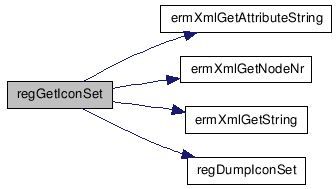
| regLastConnect_t* regGetLastConnect | ( | const regRegistry_t * | pRegistry | ) |
Definition at line 3259 of file erregxml.c.
03260 { 03261 regLastConnect_t *theLastConnect = NULL; 03262 03263 ERREG_LOGPRINTF("entry"); 03264 g_assert(pRegistry); 03265 g_assert(pRegistry->xpaths); 03266 g_assert(pRegistry->xpaths->lastConnect); 03267 03268 char xpath[BUF_LEN + 1], szTmp[BUF_LEN + 1]; 03269 int nLen, nRet; 03270 03271 const erManifest *pXmlCxt = &(pRegistry->xmlCxt); 03272 03273 theLastConnect = g_new0(regLastConnect_t, 1); 03274 g_assert(theLastConnect != NULL); 03275 03276 // profileConnectedIDS 03277 nLen = g_snprintf(xpath, BUF_LEN, "%s/%s", pRegistry->xpaths->lastConnect, EL_PROFILE_CONNECTED_IDS); 03278 nRet = ermXmlGetInt(pXmlCxt, xpath, &theLastConnect->profileConnectedIDS); 03279 if (RET_ERR == nRet) 03280 { 03281 regFreeLastConnect(theLastConnect); 03282 theLastConnect = NULL; 03283 return NULL; 03284 } 03285 03286 // profileConnectedPC 03287 nLen = g_snprintf(xpath, BUF_LEN, "%s/%s", pRegistry->xpaths->lastConnect, EL_PROFILE_CONNECTED_PC); 03288 nRet = ermXmlGetInt(pXmlCxt, xpath, &theLastConnect->profileConnectedPC); 03289 if (RET_ERR == nRet) 03290 { 03291 regFreeLastConnect(theLastConnect); 03292 theLastConnect = NULL; 03293 return NULL; 03294 } 03295 03296 // connect to which server 03297 nLen = g_snprintf(xpath, BUF_LEN, "%s/%s", pRegistry->xpaths->lastConnect, EL_MANUAL_CONNECT_TYPE); 03298 nRet = ermXmlGetString(pXmlCxt, xpath, szTmp, BUF_LEN); 03299 if (RET_ERR == nRet) 03300 { 03301 ERREG_ERRORPRINTF("Can't get which server to connect from memory."); 03302 regFreeLastConnect(theLastConnect); 03303 theLastConnect = NULL; 03304 return NULL; 03305 } 03306 theLastConnect->manualConnectType = regServerTypeToEnum(szTmp); 03307 03308 regDumpLastConnect(theLastConnect); 03309 return theLastConnect; 03310 }
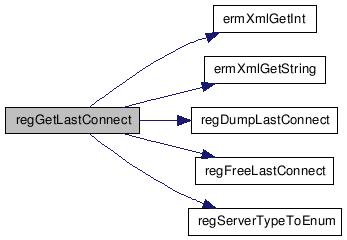
| regLastRead_t* regGetLastRead | ( | const char * | ID, | |
| regRegistry_t * | pRegistry | |||
| ) |
Definition at line 1614 of file erregxml.c.
01615 { 01616 regLastRead_t *theLastRead = NULL; 01617 01618 ERREG_LOGPRINTF("entry %s %p", ID, pRegistry); 01619 g_assert(ID); 01620 g_assert(pRegistry); 01621 g_assert(pRegistry->xpaths); 01622 g_assert(pRegistry->xpaths->lastRead); 01623 01624 char xpath[BUF_LEN + 1], szTmp[BUF_LEN + 1], xpathExt[BUF_LEN + 1]; 01625 int nLen, nRet; 01626 01627 erManifest *pXmlCxt = &(pRegistry->xmlCxt); 01628 01629 theLastRead = g_new0(regLastRead_t, 1); 01630 g_assert(theLastRead != NULL); 01631 01632 nLen = g_snprintf(xpath, BUF_LEN, "%s[@%s=\"%s\"]", pRegistry->xpaths->lastRead, ATTR_TYPE, ID); 01633 01634 // extension 01635 nLen = g_snprintf(xpathExt, BUF_LEN, "%s/%s", xpath, EL_EXT_NAME); 01636 nRet = ermXmlGetString(pXmlCxt, xpathExt, szTmp, BUF_LEN); 01637 if (RET_ERR == nRet) 01638 { 01639 ERREG_ERRORPRINTF("Can't get extension from memory."); 01640 regFreeLastRead(theLastRead); 01641 theLastRead = NULL; 01642 return NULL; 01643 } 01644 theLastRead->extension = g_strdup(szTmp); 01645 01646 // documentPath 01647 nLen = g_snprintf(xpathExt, BUF_LEN, "%s/%s", xpath, EL_DOCUMENT_PATH); 01648 nRet = ermXmlGetString(pXmlCxt, xpathExt, szTmp, BUF_LEN); 01649 if (RET_ERR == nRet) 01650 { 01651 ERREG_ERRORPRINTF("Can't get documentPath from memory."); 01652 regFreeLastRead(theLastRead); 01653 theLastRead = NULL; 01654 return NULL; 01655 } 01656 theLastRead->documentPath = g_strdup(szTmp); 01657 01658 // manifestPath 01659 nLen = g_snprintf(xpathExt, BUF_LEN, "%s/%s", xpath, EL_MANIFEST_PATH); 01660 nRet = ermXmlGetString(pXmlCxt, xpathExt, szTmp, BUF_LEN); 01661 if (RET_ERR == nRet) 01662 { 01663 ERREG_ERRORPRINTF("Can't get manifestPath from memory."); 01664 regFreeLastRead(theLastRead); 01665 theLastRead = NULL; 01666 return NULL; 01667 } 01668 theLastRead->manifestPath = g_strdup(szTmp); 01669 01670 // position 01671 nLen = g_snprintf(xpathExt, BUF_LEN, "%s/%s", xpath, EL_POSITION); 01672 nRet = ermXmlGetString(pXmlCxt, xpathExt, szTmp, BUF_LEN); 01673 if (RET_ERR == nRet) 01674 { 01675 ERREG_ERRORPRINTF("Can't get position from memory."); 01676 regFreeLastRead(theLastRead); 01677 theLastRead = NULL; 01678 return NULL; 01679 } 01680 theLastRead->position = g_strdup(szTmp); 01681 01682 regDumpLastRead(ID, theLastRead); 01683 return theLastRead; 01684 }
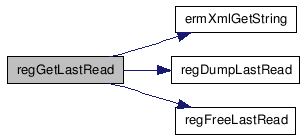
| regNetworkConfig_t* regGetNetworkConfig | ( | const regRegistry_t * | pRegistry | ) |
Definition at line 2492 of file erregxml.c.
02493 { 02494 regNetworkConfig_t *theNetworkConfig = NULL; 02495 02496 ERREG_LOGPRINTF("entry %p", pRegistry); 02497 g_assert(pRegistry); 02498 g_assert(pRegistry->xpaths); 02499 g_assert(pRegistry->xpaths->networkProfile); 02500 02501 char xpath[BUF_LEN + 1], szTmp[BUF_LEN + 1]; 02502 int nLen, i, nProfiles, nRet; 02503 02504 const erManifest *pXmlCxt = &(pRegistry->xmlCxt); 02505 02506 // get the number of nodes('application') 02507 nLen = g_snprintf(xpath, BUF_LEN, "%s", pRegistry->xpaths->networkProfile); 02508 nRet = ermXmlGetNodeNr(pXmlCxt, xpath, &nProfiles); 02509 if (RET_ERR == nRet || 0 == nProfiles) 02510 { 02511 ERREG_ERRORPRINTF("%s not present", xpath); 02512 return NULL; 02513 } 02514 02515 // memory malloc 02516 theNetworkConfig = g_new0(regNetworkConfig_t, 1); 02517 g_assert(theNetworkConfig != NULL); 02518 02519 theNetworkConfig->size = nProfiles; 02520 theNetworkConfig->networkList = g_new0(char *, nProfiles + 1); 02521 theNetworkConfig->networkList[nProfiles] = NULL; 02522 02523 // get the value of attribute(networkProfile[i]/@profileID) 02524 for (i = 1; i <= nProfiles; i++) 02525 { 02526 nLen = g_snprintf(xpath, BUF_LEN, "%s[%d]", pRegistry->xpaths->networkProfile, i); 02527 nRet = ermXmlGetAttributeString(pXmlCxt, xpath, ATTR_PROFILE_ID, szTmp, BUF_LEN); 02528 if (RET_OK == nRet) 02529 { 02530 theNetworkConfig->networkList[i - 1] = g_strdup(szTmp); 02531 } 02532 } 02533 02534 // sort on profileID 02535 qsort( theNetworkConfig->networkList, 02536 theNetworkConfig->size, 02537 sizeof(theNetworkConfig->networkList[0]), 02538 compare_profileID ); 02539 02540 regDumpNetworkConfig(theNetworkConfig); 02541 return theNetworkConfig; 02542 }
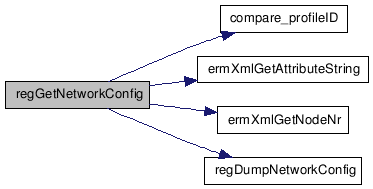
| regNetworkProfile_t* regGetNetworkProfile | ( | const char * | ID, | |
| const regRegistry_t * | pRegistry | |||
| ) |
Definition at line 2580 of file erregxml.c.
02581 { 02582 regNetworkProfile_t *theNetworkProfile = NULL; 02583 02584 ERREG_LOGPRINTF("entry: ID [%s] pXmlCxt [%p]", ID, pRegistry); 02585 g_assert(ID); 02586 g_assert(pRegistry); 02587 g_assert(pRegistry->xpaths); 02588 g_assert(pRegistry->xpaths->networkProfile); 02589 02590 char xpath[BUF_LEN + 1], xpathExt[BUF_LEN + 1], szTmp[BUF_LEN + 1]; 02591 int nLen, nRet; 02592 gboolean bDhcp, bRet; 02593 02594 const erManifest *pXmlCxt = &(pRegistry->xmlCxt); 02595 02596 theNetworkProfile = g_new0(regNetworkProfile_t, 1); 02597 g_assert(theNetworkProfile != NULL); 02598 02599 nLen = g_snprintf(xpath, BUF_LEN, "%s[@%s=\"%s\"]", 02600 pRegistry->xpaths->networkProfile, ATTR_PROFILE_ID, ID); 02601 02602 // profile name 02603 nLen = g_snprintf(xpathExt, BUF_LEN, "%s/%s", xpath, EL_PROFILE_NAME); 02604 nRet = ermXmlGetString(pXmlCxt, xpathExt, szTmp, BUF_LEN); 02605 if (RET_ERR == nRet) 02606 { 02607 g_snprintf(szTmp, BUF_LEN, "%s", ID); 02608 } 02609 theNetworkProfile->name = g_strdup(szTmp); 02610 02611 // networkType 02612 nLen = g_snprintf(xpathExt, BUF_LEN, "%s/%s", xpath, EL_NETWORK_TYPE); 02613 nRet = ermXmlGetString(pXmlCxt, xpathExt, szTmp, BUF_LEN); 02614 if (RET_ERR == nRet) 02615 { 02616 ERREG_ERRORPRINTF("Can't get network type from memory."); 02617 regFreeNetworkProfile(theNetworkProfile); 02618 theNetworkProfile = NULL; 02619 return NULL; 02620 } 02621 theNetworkProfile->connection = regNetworkTypeToEnum(szTmp); 02622 02623 // useProxy 02624 nLen = g_snprintf(xpathExt, BUF_LEN, "%s/%s", xpath, EL_USE_PROXY); 02625 nRet = ermXmlGetBoolean(pXmlCxt, xpathExt, &theNetworkProfile->proxy); 02626 if (RET_ERR == nRet) 02627 { 02628 ERREG_ERRORPRINTF("Can't get use proxy flag from memory."); 02629 regFreeNetworkProfile(theNetworkProfile); 02630 theNetworkProfile = NULL; 02631 return NULL; 02632 } 02633 02634 // userDhcp 02635 nLen = g_snprintf(xpathExt, BUF_LEN, "%s/%s", xpath, EL_USE_DHCP); 02636 nRet = ermXmlGetBoolean(pXmlCxt, xpathExt, &bDhcp); 02637 if (RET_ERR == nRet) 02638 { 02639 ERREG_ERRORPRINTF("Can't get use dhcp flag from memory."); 02640 regFreeNetworkProfile(theNetworkProfile); 02641 theNetworkProfile = NULL; 02642 return NULL; 02643 } 02644 theNetworkProfile->addressMode = regIpAddressToEnum(bDhcp); 02645 02646 if (theNetworkProfile->connection == wireless_t) 02647 { 02648 // wireless settings 02649 theNetworkProfile->wirelessSettings = g_new0(regWirelessSetting_t, 1); 02650 bRet = getWirelessSettings(pRegistry, xpath, theNetworkProfile->wirelessSettings); 02651 if (FALSE == bRet) 02652 { 02653 regFreeWirelessSetting(theNetworkProfile->wirelessSettings); 02654 theNetworkProfile->wirelessSettings = NULL; 02655 theNetworkProfile->connection = wired_t; 02656 } 02657 } 02658 else if (theNetworkProfile->connection == dialup_t) 02659 { 02660 // wireless settings 02661 theNetworkProfile->dialupSettings = g_new0(regDialupSetting_t, 1); 02662 bRet = getDialupSettings(pRegistry, xpath, theNetworkProfile->dialupSettings); 02663 if (FALSE == bRet) 02664 { 02665 regFreeDialupSetting(theNetworkProfile->dialupSettings); 02666 theNetworkProfile->dialupSettings = NULL; 02667 theNetworkProfile->connection = wired_t; 02668 } 02669 } 02670 02671 // proxy settings 02672 if (theNetworkProfile->proxy == TRUE) 02673 { 02674 theNetworkProfile->proxySettings = g_new0(regProxySetting_t, 1); 02675 bRet = getProxySettings(pRegistry, xpath, theNetworkProfile->proxySettings); 02676 if (FALSE == bRet) 02677 { 02678 regFreeProxySetting(theNetworkProfile->proxySettings); 02679 theNetworkProfile->proxySettings = NULL; 02680 theNetworkProfile->proxy = FALSE; 02681 } 02682 } 02683 02684 // IP settings 02685 if (theNetworkProfile->addressMode == static_t) 02686 { 02687 theNetworkProfile->ipSettings = g_new0(regIpSetting_t, 1); 02688 bRet = getIpSettings(pRegistry, xpath, theNetworkProfile->ipSettings); 02689 if (FALSE == bRet) 02690 { 02691 regFreeIpSetting(theNetworkProfile->ipSettings); 02692 theNetworkProfile->ipSettings = NULL; 02693 theNetworkProfile->addressMode = dhcp_t; 02694 } 02695 } 02696 02697 // timestamp 02698 nLen = g_snprintf(xpathExt, BUF_LEN, "%s/%s", xpath, EL_TIMESTAMP); 02699 nRet = ermXmlGetInt(pXmlCxt, xpathExt, &theNetworkProfile->timestamp); 02700 if (RET_ERR == nRet) 02701 { 02702 ERREG_LOGPRINTF("no timestamp found"); 02703 theNetworkProfile->timestamp = 0; 02704 } 02705 02706 regDumpNetworkProfile(ID, theNetworkProfile); 02707 return theNetworkProfile; 02708 }
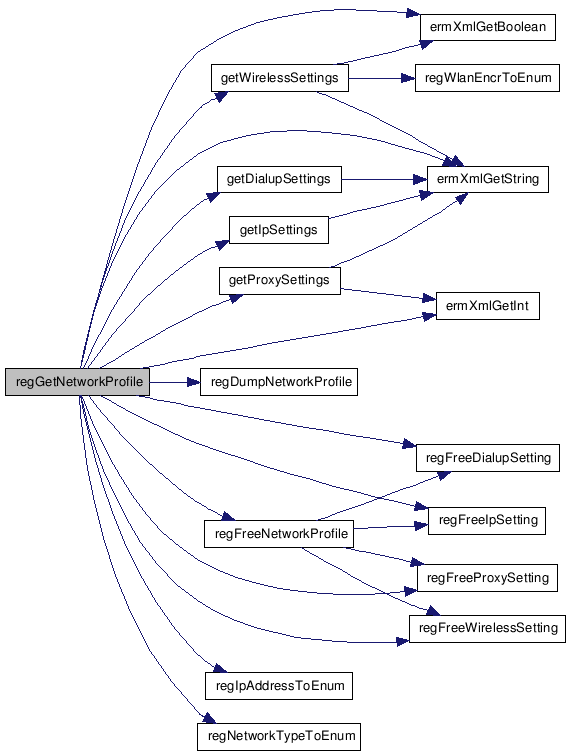
| void regGetNetworkProfiles | ( | regNetworkConfig_t ** | pNetworkConfig, | |
| regNetworkProfile_t *** | pNetworks, | |||
| const regRegistry_t * | pRegistry | |||
| ) |
Definition at line 3189 of file erregxml.c.
03190 { 03191 int i; 03192 regNetworkConfig_t *theNetworkConfig = NULL; 03193 regNetworkProfile_t **theNetworks = NULL; 03194 03195 ERREG_LOGPRINTF("entry"); 03196 g_assert(pNetworkConfig); 03197 g_assert(pNetworks); 03198 g_assert(pRegistry); 03199 03200 //destroy old profiles, just in case 03201 regFreeNetworkProfiles(*pNetworkConfig, *pNetworks); 03202 *pNetworkConfig = NULL; 03203 *pNetworks = NULL; 03204 03205 // retieve the network profile list data 03206 theNetworkConfig = regGetNetworkConfig(pRegistry); 03207 if (theNetworkConfig == NULL) 03208 { 03209 ERREG_WARNPRINTF("theNetworkConfig not present"); 03210 } 03211 else 03212 { 03213 ERREG_LOGPRINTF("theNetworkConfig exist"); 03214 03215 theNetworks = g_new0(regNetworkProfile_t *, theNetworkConfig->size); 03216 for (i = 0; i < theNetworkConfig->size; i++) 03217 { 03218 //retrieve the network data 03219 theNetworks[i] = regGetNetworkProfile(theNetworkConfig->networkList[i], pRegistry); 03220 ERREG_LOGPRINTF("theNetworks[%d] = [%p]", i, theNetworks[i]); 03221 } 03222 } 03223 03224 *pNetworkConfig = theNetworkConfig; 03225 *pNetworks = theNetworks; 03226 }
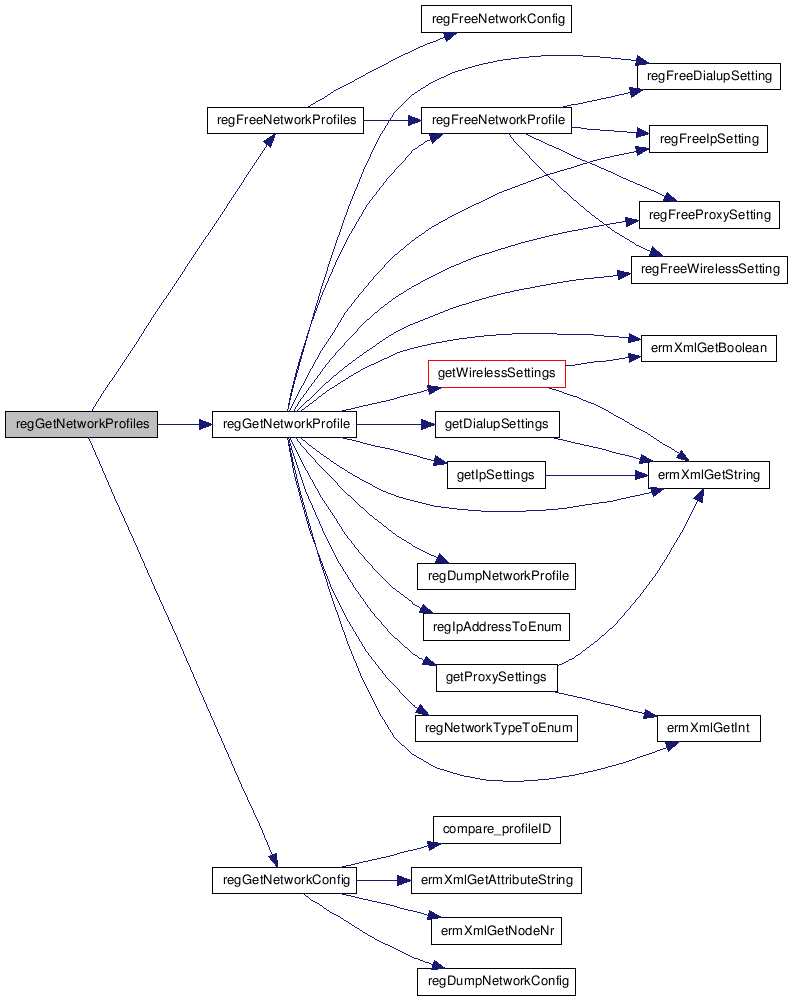
| regPCConfig_t* regGetPCConfig | ( | const regRegistry_t * | pRegistry | ) |
Definition at line 713 of file erregxml.c.
00714 { 00715 regPCConfig_t *thePCConfig = NULL; 00716 00717 ERREG_LOGPRINTF("entry %p", pRegistry); 00718 g_assert(pRegistry); 00719 g_assert(pRegistry->xpaths); 00720 g_assert(pRegistry->xpaths->pcProfile); 00721 00722 char xpath[BUF_LEN + 1], szTmp[BUF_LEN + 1]; 00723 int nLen, i, nProfiles, nRet; 00724 00725 const erManifest *pXmlCxt = &(pRegistry->xmlCxt); 00726 00727 // get the number of nodes('application') 00728 nLen = g_snprintf(xpath, BUF_LEN, "%s", pRegistry->xpaths->pcProfile); 00729 nRet = ermXmlGetNodeNr(pXmlCxt, xpath, &nProfiles); 00730 if (RET_ERR == nRet || 0 == nProfiles) 00731 { 00732 ERREG_ERRORPRINTF("%s not present", xpath); 00733 return NULL; 00734 } 00735 00736 // memory malloc 00737 thePCConfig = g_new0(regPCConfig_t, 1); 00738 g_assert(thePCConfig != NULL); 00739 00740 thePCConfig->size = nProfiles; 00741 thePCConfig->pcList = g_new0(char *, nProfiles + 1); 00742 thePCConfig->pcList[nProfiles] = NULL; 00743 00744 // get the value of attribute(pcProfile[i]/@type) 00745 for (i = 1; i <= nProfiles; i++) 00746 { 00747 nLen = g_snprintf(xpath, BUF_LEN, "%s[%d]", pRegistry->xpaths->pcProfile, i); 00748 nRet = ermXmlGetAttributeString(pXmlCxt, xpath, ATTR_PROFILE_ID, szTmp, BUF_LEN); 00749 if (RET_OK == nRet) 00750 { 00751 thePCConfig->pcList[i - 1] = g_strdup(szTmp); 00752 } 00753 } 00754 00755 regDumpPCConfig(thePCConfig); 00756 return thePCConfig; 00757 }
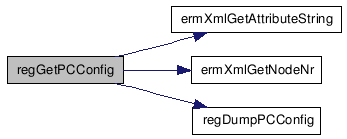
| regPCProfile_t* regGetPCProfile | ( | const char * | ID, | |
| const regRegistry_t * | pRegistry | |||
| ) |
Definition at line 794 of file erregxml.c.
00795 { 00796 regPCProfile_t *thePCProfile = NULL; 00797 00798 ERREG_LOGPRINTF("entry %s %p", ID, pRegistry); 00799 g_assert(ID); 00800 g_assert(pRegistry); 00801 g_assert(pRegistry->xpaths); 00802 g_assert(pRegistry->xpaths->pcProfile); 00803 00804 char xpath[BUF_LEN + 1], szTmp[BUF_LEN + 1], xpathExt[BUF_LEN + 1]; 00805 int nLen, nRet; 00806 00807 const erManifest *pXmlCxt = &(pRegistry->xmlCxt); 00808 00809 thePCProfile = g_new0(regPCProfile_t, 1); 00810 g_assert(thePCProfile != NULL); 00811 00812 // xpath 00813 nLen = g_snprintf(xpath, BUF_LEN, "%s[@%s=\"%s\"]", pRegistry->xpaths->pcProfile, ATTR_PROFILE_ID, ID); 00814 00815 // name 00816 nLen = g_snprintf(xpathExt, BUF_LEN, "%s/%s", xpath, EL_PROFILE_NAME); 00817 nRet = ermXmlGetString(pXmlCxt, xpathExt, szTmp, BUF_LEN); 00818 if (RET_ERR == nRet) 00819 { 00820 g_snprintf(szTmp, BUF_LEN, "%s", ID); 00821 } 00822 thePCProfile->name = g_strdup(szTmp); 00823 00824 // pcname 00825 nLen = g_snprintf(xpathExt, BUF_LEN, "%s/%s", xpath, EL_PC_NAME); 00826 nRet = ermXmlGetString(pXmlCxt, xpathExt, szTmp, BUF_LEN); 00827 if (RET_ERR == nRet) 00828 { 00829 ERREG_ERRORPRINTF("Can't get pcname from memory."); 00830 regFreePCProfile(thePCProfile); 00831 thePCProfile = NULL; 00832 return NULL; 00833 } 00834 thePCProfile->pcname = g_strdup(szTmp); 00835 00836 // sharename 00837 nLen = g_snprintf(xpathExt, BUF_LEN, "%s/%s", xpath, EL_SHARE_NAME); 00838 nRet = ermXmlGetString(pXmlCxt, xpathExt, szTmp, BUF_LEN); 00839 if (RET_ERR == nRet) 00840 { 00841 ERREG_ERRORPRINTF("Can't get sharename from memory."); 00842 regFreePCProfile(thePCProfile); 00843 thePCProfile = NULL; 00844 return NULL; 00845 } 00846 thePCProfile->sharename = g_strdup(szTmp); 00847 00848 // workgroup 00849 nLen = g_snprintf(xpathExt, BUF_LEN, "%s/%s", xpath, EL_WORKGROUP); 00850 nRet = ermXmlGetString(pXmlCxt, xpathExt, szTmp, BUF_LEN); 00851 if (RET_ERR == nRet) 00852 { 00853 ERREG_ERRORPRINTF("Can't get workgroup from memory."); 00854 regFreePCProfile(thePCProfile); 00855 thePCProfile = NULL; 00856 return NULL; 00857 } 00858 thePCProfile->workgroup = g_strdup(szTmp); 00859 00860 // username 00861 nLen = g_snprintf(xpathExt, BUF_LEN, "%s/%s", xpath, EL_USER_NAME); 00862 nRet = ermXmlGetString(pXmlCxt, xpathExt, szTmp, BUF_LEN); 00863 if (RET_ERR == nRet) 00864 { 00865 ERREG_ERRORPRINTF("Can't get username from memory."); 00866 regFreePCProfile(thePCProfile); 00867 thePCProfile = NULL; 00868 return NULL; 00869 } 00870 thePCProfile->username = g_strdup(szTmp); 00871 00872 // password 00873 nLen = g_snprintf(xpathExt, BUF_LEN, "%s/%s", xpath, EL_PASSWORD); 00874 nRet = ermXmlGetString(pXmlCxt, xpathExt, szTmp, BUF_LEN); 00875 if (RET_ERR == nRet) 00876 { 00877 ERREG_ERRORPRINTF("Can't get password from memory."); 00878 regFreePCProfile(thePCProfile); 00879 thePCProfile = NULL; 00880 return NULL; 00881 } 00882 thePCProfile->password = g_strdup(szTmp); 00883 00884 regDumpPCProfile(ID, thePCProfile); 00885 return thePCProfile; 00886 }
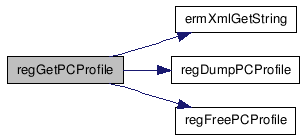
| void regGetPCProfiles | ( | regPCConfig_t ** | pPCConfig, | |
| regPCProfile_t *** | pPCs, | |||
| const regRegistry_t * | pRegistry | |||
| ) |
Definition at line 1055 of file erregxml.c.
01056 { 01057 int i; 01058 regPCConfig_t *thePCConfig = NULL; 01059 regPCProfile_t **thePCs = NULL; 01060 01061 ERREG_LOGPRINTF("entry"); 01062 g_assert(pPCConfig); 01063 g_assert(pPCs); 01064 g_assert(pRegistry); 01065 01066 //destroy old profiles, just in case 01067 regFreePCProfiles(*pPCConfig, *pPCs); 01068 *pPCConfig = NULL; 01069 *pPCs = NULL; 01070 01071 // retieve the pc config data 01072 thePCConfig = regGetPCConfig(pRegistry); 01073 if (thePCConfig == NULL) 01074 { 01075 ERREG_WARNPRINTF("thePCConfig not present"); 01076 } 01077 else 01078 { 01079 ERREG_LOGPRINTF("thePCConfig exist"); 01080 01081 thePCs = g_new0(regPCProfile_t *, thePCConfig->size); 01082 for (i = 0; i < thePCConfig->size; i++) 01083 { 01084 //retrieve the pc data 01085 thePCs[i] = regGetPCProfile(thePCConfig->pcList[i], pRegistry); 01086 ERREG_LOGPRINTF("thePCs[%d] = [%p]", i, thePCs[i]); 01087 } 01088 } 01089 01090 *pPCConfig = thePCConfig; 01091 *pPCs = thePCs; 01092 }
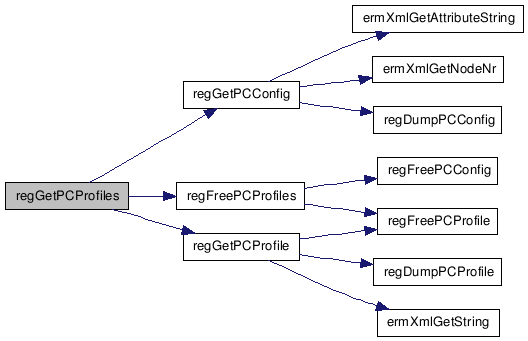
| regStartUp_t* regGetStartUp | ( | const regRegistry_t * | pRegistry | ) |
NOT TESTED: not used, may not work, maybe needs to be reworked to regSetExtInfoList. ** gboolean regSetExtInfo(const char *extension, const regExtInfo_t *theExtInfo, regRegistry_t *pRegistry) { ERREG_LOGPRINTF("entry %s %p %p", extension, theExtInfo, pRegistry); g_assert(extension); g_assert(theExtInfo); g_assert(pRegistry); g_assert(pRegistry->xpaths); g_assert(pRegistry->xpaths->extensionInfo);
regDumpExtInfo(theExtInfo);
char xpath[BUF_LEN + 1], xpathExt[BUF_LEN + 1]; int nLen, nRet;
erManifest *pXmlCxt = &(pRegistry->xmlCxt);
extensionInfo[extName=s] nLen = g_snprintf(xpath, BUF_LEN, "%s[%s=\"s\"]", pRegistry->xpaths->extensionInfo, EL_EXT_NAME, extension);
extensionInfo[extName=s]/associateApp if (theExtInfo->associateApp) { nLen = g_snprintf(xpathExt, BUF_LEN, "%s/%s", xpath, EL_ASSOCIATE_APP); nRet = ermXmlCheckXpath(pXmlCxt, xpathExt); if (RET_OK == nRet) { nRet = ermXmlSetString(pXmlCxt, xpathExt, theExtInfo->associateApp); } if (RET_ERR == nRet) { return FALSE; } }
extensionInfo[extName=s]/extIcon if (theExtInfo->iconLocation) { nLen = g_snprintf(xpathExt, BUF_LEN, "%s/%s", xpath, EL_EXT_ICON); nRet = ermXmlCheckXpath(pXmlCxt, xpathExt); if (RET_OK == nRet) { nRet = ermXmlSetString(pXmlCxt, xpathExt, theExtInfo->iconLocation); } if (RET_ERR == nRet) { return FALSE; } }
pRegistry->changed = TRUE; return TRUE; }
Definition at line 2188 of file erregxml.c.
02189 { 02190 regStartUp_t *theStartUp = NULL; 02191 02192 ERREG_LOGPRINTF("entry"); 02193 g_assert(pRegistry); 02194 g_assert(pRegistry->xpaths); 02195 g_assert(pRegistry->xpaths->startup); 02196 02197 char xpath[BUF_LEN + 1], szTmp[BUF_LEN + 1]; 02198 int nLen, nRet; 02199 02200 const erManifest *pXmlCxt = &(pRegistry->xmlCxt); 02201 02202 theStartUp = g_new0(regStartUp_t, 1); 02203 g_assert(theStartUp != NULL); 02204 02205 // behaviour 02206 nLen = g_snprintf(xpath, BUF_LEN, "%s/%s", pRegistry->xpaths->startup, EL_BEHAVIOUR); 02207 nRet = ermXmlGetString(pXmlCxt, xpath, szTmp, BUF_LEN); 02208 if (RET_ERR == nRet) 02209 { 02210 regFreeStartUp(theStartUp); 02211 theStartUp = NULL; 02212 return NULL; 02213 } 02214 theStartUp->behaviour = regBehaviourToEnum(szTmp); 02215 02216 // documentPath 02217 nLen = g_snprintf(xpath, BUF_LEN, "%s/%s", pRegistry->xpaths->startup, EL_DOCUMENT_PATH); 02218 nRet = ermXmlGetString(pXmlCxt, xpath, szTmp, BUF_LEN); 02219 if (RET_ERR == nRet) 02220 { 02221 regFreeStartUp(theStartUp); 02222 theStartUp = NULL; 02223 return NULL; 02224 } 02225 theStartUp->documentPath = g_strdup(szTmp); 02226 02227 regDumpStartUp(theStartUp); 02228 return theStartUp; 02229 02230 }
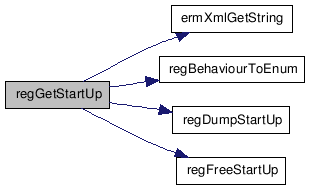
| regTimedIds_t* regGetTimedIds | ( | const regRegistry_t * | pRegistry | ) |
Definition at line 1262 of file erregxml.c.
01263 { 01264 regTimedIds_t *theTimedIds = NULL; 01265 01266 ERREG_LOGPRINTF("entry %p", pRegistry); 01267 g_assert(pRegistry); 01268 g_assert(pRegistry->xpaths); 01269 g_assert(pRegistry->xpaths->autoConnect); 01270 01271 char xpath[BUF_LEN + 1], szTmp[BUF_LEN + 1]; 01272 int nRet; 01273 01274 const erManifest *pXmlCxt = &(pRegistry->xmlCxt); 01275 01276 theTimedIds = g_new0(regTimedIds_t, 1); 01277 g_assert(theTimedIds != NULL); 01278 01279 // Enable timed-iDS connection or not 01280 g_snprintf(xpath, BUF_LEN, "%s/%s/%s", pRegistry->xpaths->autoConnect, EL_TIMED_IDS, EL_ENABLE_TIMEDIDS); 01281 nRet = ermXmlGetBoolean(pXmlCxt, xpath, &theTimedIds->enable); 01282 if (nRet == RET_ERR) 01283 { 01284 regFreeTimedIds(theTimedIds); 01285 return NULL; 01286 } 01287 01288 // How many valid time count in time set 01289 g_snprintf(xpath, BUF_LEN, "%s/%s/%s/%s", pRegistry->xpaths->autoConnect, EL_TIMED_IDS, EL_TIMESET, EL_TIME); 01290 nRet = ermXmlGetNodeNr(pXmlCxt, xpath, &theTimedIds->timeCnt); 01291 if (nRet == RET_ERR) 01292 { 01293 regFreeTimedIds(theTimedIds); 01294 return NULL; 01295 } 01296 01297 // Time set 01298 int i, hh, mm, ss; 01299 for (i=1; i<=theTimedIds->timeCnt; i++) 01300 { 01301 g_snprintf(xpath, BUF_LEN, "%s/%s/%s/%s[%d]", pRegistry->xpaths->autoConnect, EL_TIMED_IDS, EL_TIMESET, EL_TIME, i); 01302 nRet = ermXmlGetString(pXmlCxt, xpath, szTmp, BUF_LEN); 01303 01304 if (RET_ERR == nRet) 01305 { 01306 regFreeTimedIds(theTimedIds); 01307 return NULL; 01308 } 01309 01310 sscanf(szTmp, "%02d:%02d:%02d", &hh, &mm, &ss); 01311 theTimedIds->timeSet[i-1] = hh*3600 + mm*60 + ss; 01312 } 01313 01314 // Enable software updates while connected to iDS 01315 g_snprintf(xpath, BUF_LEN, "%s/%s/%s", pRegistry->xpaths->autoConnect, EL_TIMED_IDS, EL_ENABLE_SWUPDATE); 01316 nRet = ermXmlGetBoolean(pXmlCxt, xpath, &theTimedIds->swUpdate); 01317 if (nRet == RET_ERR) 01318 { 01319 regFreeTimedIds(theTimedIds); 01320 return NULL; 01321 } 01322 01323 // Switch off iLiad after waking iLiad up 01324 g_snprintf(xpath, BUF_LEN, "%s/%s/%s", pRegistry->xpaths->autoConnect, EL_TIMED_IDS, EL_ENABLE_SWITCHOFF); 01325 nRet = ermXmlGetBoolean(pXmlCxt, xpath, &theTimedIds->switchOff); 01326 if (nRet == RET_ERR) 01327 { 01328 regFreeTimedIds(theTimedIds); 01329 return NULL; 01330 } 01331 01332 regDumpTimedIds(theTimedIds); 01333 return theTimedIds; 01334 }
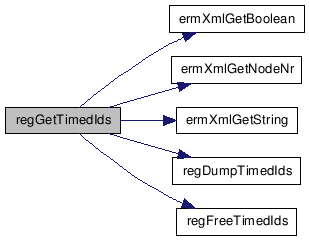
| regUserApp_t* regGetUserApp | ( | const char * | uaID, | |
| const regRegistry_t * | pRegistry | |||
| ) |
Definition at line 1808 of file erregxml.c.
01809 { 01810 regUserApp_t *theUserApp = NULL; 01811 01812 ERREG_LOGPRINTF("entry %s %p", uaID, pRegistry); 01813 g_assert(uaID); 01814 g_assert(pRegistry); 01815 g_assert(pRegistry->xpaths); 01816 g_assert(pRegistry->xpaths->application); 01817 01818 char xpath[BUF_LEN + 1], szTmp[BUF_LEN + 1], xpathExt[BUF_LEN + 1]; 01819 int nLen, nRet, nFormat; 01820 01821 const erManifest *pXmlCxt = &(pRegistry->xmlCxt); 01822 01823 theUserApp = g_new0(regUserApp_t, 1); 01824 g_assert(theUserApp != NULL); 01825 01826 nLen = g_snprintf(xpath, BUF_LEN, "%s[@%s=\"%s\"]", pRegistry->xpaths->application, ATTR_TYPE, uaID); 01827 01828 // appCategory 01829 nLen = g_snprintf(xpathExt, BUF_LEN, "%s/%s", xpath, EL_APP_CATEGORY); 01830 nRet = ermXmlGetString(pXmlCxt, xpathExt, szTmp, BUF_LEN); 01831 if (RET_ERR == nRet) 01832 { 01833 ERREG_ERRORPRINTF("%s not present", xpathExt); 01834 regFreeUserApp(theUserApp); 01835 return NULL; 01836 } 01837 theUserApp->szCategory = g_strdup(szTmp); 01838 01839 // szArgMask 01840 nLen = g_snprintf(xpathExt, BUF_LEN, "%s/%s", xpath, EL_ARG_MASK); 01841 nRet = ermXmlGetString(pXmlCxt, xpathExt, szTmp, BUF_LEN); 01842 if (RET_ERR == nRet) 01843 { 01844 ERREG_ERRORPRINTF("%s not present", xpathExt); 01845 regFreeUserApp(theUserApp); 01846 return NULL; 01847 } 01848 theUserApp->szArgMask = g_strdup(szTmp); 01849 01850 // szExec 01851 nLen = g_snprintf(xpathExt, BUF_LEN, "%s/%s", xpath, EL_EXECUTE); 01852 nRet = ermXmlGetString(pXmlCxt, xpathExt, szTmp, BUF_LEN); 01853 if (RET_ERR == nRet) 01854 { 01855 ERREG_ERRORPRINTF("%s not present", xpathExt); 01856 regFreeUserApp(theUserApp); 01857 return NULL; 01858 } 01859 theUserApp->szExec = g_strdup(szTmp); 01860 01861 // xResName 01862 nLen = g_snprintf(xpathExt, BUF_LEN, "%s/%s", xpath, EL_X_RES_NAME); 01863 nRet = ermXmlGetString(pXmlCxt, xpathExt, szTmp, BUF_LEN); 01864 if (RET_ERR == nRet) 01865 { 01866 ERREG_ERRORPRINTF("%s not present", xpathExt); 01867 regFreeUserApp(theUserApp); 01868 return NULL; 01869 } 01870 theUserApp->xResName = g_strdup(szTmp); 01871 01872 // ipcChannel 01873 nLen = g_snprintf(xpathExt, BUF_LEN, "%s/%s", xpath, EL_IPC_CHANNEL); 01874 nRet = ermXmlGetInt(pXmlCxt, xpathExt, &(theUserApp->ipcChannel)); 01875 if (RET_ERR == nRet) 01876 { 01877 ERREG_ERRORPRINTF("%s not present", xpathExt); 01878 regFreeUserApp(theUserApp); 01879 return NULL; 01880 } 01881 01882 // appIconPath 01883 nLen = g_snprintf(xpathExt, BUF_LEN, "%s/%s", xpath, EL_APP_ICON_PATH); 01884 nRet = ermXmlGetString(pXmlCxt, xpathExt, szTmp, BUF_LEN); 01885 if (RET_ERR == nRet) 01886 { 01887 ERREG_WARNPRINTF("%s not present", xpathExt); 01888 theUserApp->appIconPath = g_strdup(szTmp); 01889 } 01890 01891 // supportFormat 01892 nLen = g_snprintf(xpathExt, BUF_LEN, "%s/%s/%s", xpath, EL_SUPPORT_FORMAT, EL_EXT_NAME); 01893 nRet = ermXmlGetNodeNr(pXmlCxt, xpathExt, &nFormat); 01894 if ((RET_OK == nRet) && nFormat) 01895 { 01896 int i; 01897 01898 theUserApp->extensionArray = g_new0(char *, nFormat + 1); 01899 theUserApp->extensionArray[nFormat] = NULL; 01900 theUserApp->extensionArraySize = nFormat; 01901 01902 for (i = 1; i <= nFormat; i++) 01903 { 01904 nLen = g_snprintf(xpathExt, BUF_LEN, "%s/%s/%s[%d]", xpath, EL_SUPPORT_FORMAT, EL_EXT_NAME, i); 01905 nRet = ermXmlGetString(pXmlCxt, xpathExt, szTmp, BUF_LEN); 01906 if (RET_OK == nRet) 01907 { 01908 theUserApp->extensionArray[i - 1] = g_strdup(szTmp); 01909 } 01910 } // for (i...) 01911 } // if ((RET_OK == nRet) && nFormat) 01912 01913 regDumpUserApp(uaID, theUserApp); 01914 return theUserApp; 01915 }
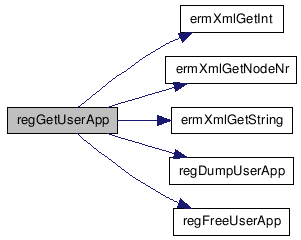
| regUserAppList_t* regGetUserAppList | ( | const regRegistry_t * | pRegistry | ) |
Definition at line 1764 of file erregxml.c.
01765 { 01766 regUserAppList_t *theUserAppList = NULL; 01767 01768 ERREG_LOGPRINTF("entry %p", pRegistry); 01769 g_assert(pRegistry); 01770 g_assert(pRegistry->xpaths); 01771 g_assert(pRegistry->xpaths->application); 01772 01773 char xpath[BUF_LEN + 1], szTmp[BUF_LEN + 1]; 01774 int nLen, i, nApp, nRet; 01775 01776 const erManifest *pXmlCxt = &(pRegistry->xmlCxt); 01777 01778 // get the number of nodes('application') 01779 nLen = g_snprintf(xpath, BUF_LEN, "%s", pRegistry->xpaths->application); 01780 nRet = ermXmlGetNodeNr(pXmlCxt, xpath, &nApp); 01781 if (RET_ERR == nRet || 0 == nApp) 01782 { 01783 ERREG_ERRORPRINTF("%s not present", xpath); 01784 return NULL; 01785 } 01786 01787 // memory malloc 01788 theUserAppList = g_new0(regUserAppList_t, 1); 01789 theUserAppList->uaIDArraySize = nApp; 01790 theUserAppList->uaIDArray = g_new0(char *, nApp + 1); 01791 theUserAppList->uaIDArray[nApp] = NULL; 01792 01793 // get the value of attribute(application[i]/@type) 01794 for (i = 1; i <= nApp; i++) 01795 { 01796 nLen = g_snprintf(xpath, BUF_LEN, "%s[%d]", pRegistry->xpaths->application, i); 01797 nRet = ermXmlGetAttributeString(pXmlCxt, xpath, ATTR_TYPE, szTmp, BUF_LEN); 01798 if (RET_OK == nRet) 01799 { 01800 theUserAppList->uaIDArray[i - 1] = g_strdup(szTmp); 01801 } 01802 } 01803 01804 regDumpUserAppList(theUserAppList); 01805 return theUserAppList; 01806 }
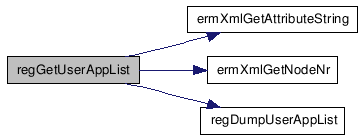
| regUserProfile_t* regGetUserProfile | ( | const regRegistry_t * | pRegistry | ) |
Definition at line 322 of file erregxml.c.
00323 { 00324 regUserProfile_t *theUserProfile = NULL; 00325 00326 ERREG_LOGPRINTF("entry"); 00327 g_assert(pRegistry); 00328 g_assert(pRegistry->xpaths); 00329 g_assert(pRegistry->xpaths->userProfile); 00330 00331 char xpath[BUF_LEN + 1], szTmp[BUF_LEN + 1]; 00332 int nLen, nRet; 00333 00334 const erManifest *pXmlCxt = &(pRegistry->xmlCxt); 00335 00336 theUserProfile = g_new0(regUserProfile_t, 1); 00337 g_assert(theUserProfile != NULL); 00338 00339 // name 00340 nLen = g_snprintf(xpath, BUF_LEN, "%s/%s", pRegistry->xpaths->userProfile, EL_NAME); 00341 nRet = ermXmlGetString(pXmlCxt, xpath, szTmp, BUF_LEN); 00342 if (RET_ERR == nRet) 00343 { 00344 ERREG_ERRORPRINTF("Can't get name from memory."); 00345 regFreeUserProfile(theUserProfile); 00346 theUserProfile = NULL; 00347 return NULL; 00348 } 00349 theUserProfile->name = g_strdup(szTmp); 00350 00351 // email 00352 nLen = g_snprintf(xpath, BUF_LEN, "%s/%s", pRegistry->xpaths->userProfile, EL_EMAIL); 00353 nRet = ermXmlGetString(pXmlCxt, xpath, szTmp, BUF_LEN); 00354 if (RET_ERR == nRet) 00355 { 00356 ERREG_ERRORPRINTF("Can't get email from memory."); 00357 regFreeUserProfile(theUserProfile); 00358 theUserProfile = NULL; 00359 return NULL; 00360 } 00361 theUserProfile->email = g_strdup(szTmp); 00362 00363 // password 00364 nLen = g_snprintf(xpath, BUF_LEN, "%s/%s", pRegistry->xpaths->userProfile, EL_PASSWORD); 00365 nRet = ermXmlGetString(pXmlCxt, xpath, szTmp, BUF_LEN); 00366 if (RET_ERR == nRet) 00367 { 00368 ERREG_ERRORPRINTF("Can't get password from memory."); 00369 regFreeUserProfile(theUserProfile); 00370 theUserProfile = NULL; 00371 return NULL; 00372 } 00373 theUserProfile->password = g_strdup(szTmp); 00374 00375 // redirectUrl 00376 gboolean bConfig = FALSE; 00377 char* cp = strstr(pRegistry->xpaths->userProfile, EL_CONFIG_ROOT); 00378 bConfig = (cp != NULL) ? TRUE : FALSE; 00379 ERREG_LOGPRINTF("bConfig=%d", bConfig); 00380 if (!bConfig) 00381 { 00382 nLen = g_snprintf(xpath, BUF_LEN, "%s/%s", pRegistry->xpaths->userProfile, EL_REDIRECT_URL); 00383 nRet = ermXmlGetString(pXmlCxt, xpath, szTmp, BUF_LEN); 00384 if (RET_ERR == nRet) 00385 { 00386 ERREG_ERRORPRINTF("Can't get redirectUrl from memory."); 00387 regFreeUserProfile(theUserProfile); 00388 theUserProfile = NULL; 00389 return NULL; 00390 } 00391 theUserProfile->redirectUrl = g_strdup(szTmp); 00392 } 00393 00394 regDumpUserProfile(theUserProfile); 00395 return theUserProfile; 00396 }
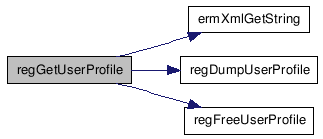
| regUserSetting_t* regGetUserSetting | ( | const regRegistry_t * | pRegistry | ) |
Definition at line 477 of file erregxml.c.
00478 { 00479 regUserSetting_t *theUserSetting = NULL; 00480 00481 ERREG_LOGPRINTF("entry"); 00482 g_assert(pRegistry); 00483 g_assert(pRegistry->xpaths); 00484 g_assert(pRegistry->xpaths->userSetting); 00485 00486 char xpath[BUF_LEN + 1], szTmp[BUF_LEN + 1]; 00487 int nLen, nRet; 00488 gboolean bEnable; 00489 00490 const erManifest *pXmlCxt = &(pRegistry->xmlCxt); 00491 00492 theUserSetting = g_new0(regUserSetting_t, 1); 00493 g_assert(theUserSetting != NULL); 00494 00495 // language 00496 nLen = g_snprintf(xpath, BUF_LEN, "%s/%s", pRegistry->xpaths->userSetting, EL_LANGUAGE); 00497 nRet = ermXmlGetString(pXmlCxt, xpath, szTmp, BUF_LEN); 00498 if (RET_ERR == nRet) 00499 { 00500 ERREG_ERRORPRINTF("Can't get language from memory."); 00501 regFreeUserSetting(theUserSetting); 00502 theUserSetting = NULL; 00503 return NULL; 00504 } 00505 theUserSetting->language = g_strdup(szTmp); 00506 00507 // sound 00508 nLen = g_snprintf(xpath, BUF_LEN, "%s/%s/%s", pRegistry->xpaths->userSetting, EL_SOUND, EL_ENABLE); 00509 nRet = ermXmlGetBoolean(pXmlCxt, xpath, &bEnable); 00510 if (RET_ERR == nRet) 00511 { 00512 ERREG_ERRORPRINTF("Can't get sound enable flag from memory."); 00513 regFreeUserSetting(theUserSetting); 00514 theUserSetting = NULL; 00515 return NULL; 00516 } 00517 00518 if (!bEnable) 00519 { 00520 theUserSetting->volume = 0; 00521 } 00522 else 00523 { 00524 nLen = g_snprintf(xpath, BUF_LEN, "%s/%s/%s", pRegistry->xpaths->userSetting, EL_SOUND, EL_VOLUME); 00525 nRet = ermXmlGetInt(pXmlCxt, xpath, &theUserSetting->volume); 00526 if (RET_ERR == nRet) 00527 { 00528 ERREG_ERRORPRINTF("Can't get sound volume from memory."); 00529 regFreeUserSetting(theUserSetting); 00530 theUserSetting = NULL; 00531 return NULL; 00532 } 00533 } 00534 00535 // keyBuffering 00536 nLen = g_snprintf(xpath, BUF_LEN, "%s/%s/%s", pRegistry->xpaths->userSetting, EL_KEY_BUFFERING, EL_ENABLE); 00537 nRet = ermXmlGetBoolean(pXmlCxt, xpath, &bEnable); 00538 if (RET_ERR == nRet) 00539 { 00540 ERREG_ERRORPRINTF("Can't get key buffering enable flag from memory."); 00541 regFreeUserSetting(theUserSetting); 00542 theUserSetting = NULL; 00543 return NULL; 00544 } 00545 00546 if (!bEnable) 00547 { 00548 theUserSetting->keyBuffering = 0; 00549 } 00550 else 00551 { 00552 nLen = 00553 g_snprintf(xpath, BUF_LEN, "%s/%s/%s", 00554 pRegistry->xpaths->userSetting, EL_KEY_BUFFERING, EL_NUMBER_OF_KEYS); 00555 nRet = ermXmlGetInt(pXmlCxt, xpath, &theUserSetting->keyBuffering); 00556 if (RET_ERR == nRet) 00557 { 00558 ERREG_ERRORPRINTF("Can't get the number of key buffering from memory."); 00559 regFreeUserSetting(theUserSetting); 00560 theUserSetting = NULL; 00561 return NULL; 00562 } 00563 } 00564 00565 // longkeypressTimeout 00566 nLen = g_snprintf(xpath, BUF_LEN, "%s/%s", pRegistry->xpaths->userSetting, EL_LONG_KP_TIMEOUT); 00567 nRet = ermXmlGetInt(pXmlCxt, xpath, &theUserSetting->longkeypressTimeout); 00568 if (RET_ERR == nRet) 00569 { 00570 ERREG_ERRORPRINTF("Can't get long key press timeout from memory."); 00571 regFreeUserSetting(theUserSetting); 00572 theUserSetting = NULL; 00573 return NULL; 00574 } 00575 00576 // flipbarLeftIsDown 00577 nLen = g_snprintf(xpath, BUF_LEN, "%s/%s", pRegistry->xpaths->userSetting, EL_FLIPBAR_DIRECTION); 00578 nRet = ermXmlGetBoolean(pXmlCxt, xpath, &theUserSetting->flipbarLeftIsDown); 00579 if (RET_ERR == nRet) 00580 { 00581 ERREG_ERRORPRINTF("Can't get flipbar direction from memory."); 00582 regFreeUserSetting(theUserSetting); 00583 theUserSetting = NULL; 00584 return NULL; 00585 } 00586 00587 regDumpUserSetting(theUserSetting); 00588 return theUserSetting; 00589 }
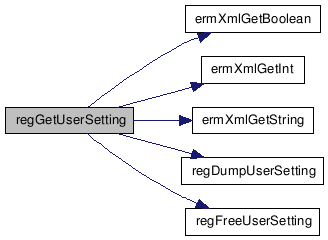
| regVersion_t* regGetVersion | ( | const regRegistry_t * | pRegistry | ) |
Definition at line 254 of file erregxml.c.
00255 { 00256 regVersion_t *theVersion = NULL; 00257 00258 ERREG_LOGPRINTF("entry %p", pRegistry); 00259 g_assert(pRegistry); 00260 g_assert(pRegistry->xpaths); 00261 g_assert(pRegistry->xpaths->version); 00262 00263 char xpath[BUF_LEN + 1], szTmp[BUF_LEN + 1]; 00264 int nLen, nRet; 00265 00266 const erManifest *pXmlCxt = &(pRegistry->xmlCxt); 00267 00268 theVersion = g_new0(regVersion_t, 1); 00269 g_assert(theVersion != NULL); 00270 00271 nLen = g_snprintf(xpath, BUF_LEN, "%s/%s", pRegistry->xpaths->version, EL_REGISTRY); 00272 nRet = ermXmlGetString(pXmlCxt, xpath, szTmp, BUF_LEN); 00273 if (RET_ERR == nRet) 00274 { 00275 ERREG_ERRORPRINTF("Can't get regVersion_t from memory."); 00276 regFreeVersion(theVersion); 00277 theVersion = NULL; 00278 return NULL; 00279 } 00280 else 00281 { 00282 theVersion->registry = g_strdup(szTmp); 00283 } 00284 00285 regDumpVersion(theVersion); 00286 return theVersion; 00287 }
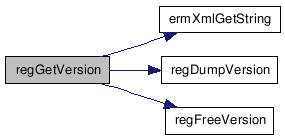
| regRegistry_t* regParseFiles | ( | const char * | szXmlFile, | |
| const char * | szXsdFile | |||
| ) |
Definition at line 124 of file erregxml.c.
00125 { 00126 ERREG_LOGPRINTF("entry: xml [%s] xsd [%s]", szXmlFile, szXsdFile); 00127 g_assert(szXmlFile); 00128 g_assert(szXsdFile); 00129 00130 regRegistry_t *pRegistry = NULL; 00131 gchar *cp; 00132 00133 // load registry file 00134 pRegistry = regParseSingleFile(szXmlFile, szXsdFile); 00135 if (pRegistry == NULL) 00136 { 00137 // load error: try .new file 00138 cp = g_strdup_printf("%s.new", szXmlFile); 00139 ERREG_WARNPRINTF("Trying registry file [%s]", cp); 00140 pRegistry = regParseSingleFile(cp, szXsdFile); 00141 g_free(cp); 00142 if (pRegistry == NULL) 00143 { 00144 // load error: try .old file 00145 cp = g_strdup_printf("%s.old", szXmlFile); 00146 ERREG_WARNPRINTF("Trying registry file [%s]", cp); 00147 pRegistry = regParseSingleFile(szXmlFile, cp); 00148 g_free(cp); 00149 } 00150 00151 // store the recovered registry values 00152 if (pRegistry) 00153 { 00154 pRegistry->changed = TRUE; 00155 if (erRegGetLockState() == lock_write) 00156 { 00157 regStore(pRegistry, szXmlFile); 00158 } 00159 } 00160 } 00161 00162 ERREG_LOGPRINTF("leave: pRegistry [%p]", pRegistry); 00163 return pRegistry; 00164 }
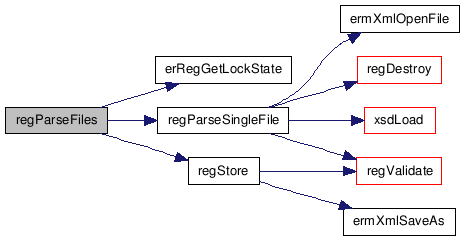
| static regRegistry_t* regParseSingleFile | ( | const char * | szXmlFile, | |
| const char * | szXsdFile | |||
| ) | [static] |
Definition at line 74 of file erregxml.c.
00075 { 00076 gboolean bRet = FALSE; // FALSE == error 00077 regRegistry_t *pRegistry = NULL; 00078 00079 ERREG_LOGPRINTF("entry: xml [%s] xsd [%s]", szXmlFile, szXsdFile); 00080 g_assert(szXmlFile); 00081 g_assert(szXsdFile); 00082 00083 // malloc memory 00084 pRegistry = g_new0(regRegistry_t, 1); 00085 g_assert(pRegistry != NULL); 00086 00087 // construct context for xml 00088 int nRet = ermXmlOpenFile(szXmlFile, &(pRegistry->xmlCxt)); 00089 if (RET_OK == nRet) 00090 { 00091 // construct context for xsd 00092 bRet = xsdLoad(&(pRegistry->xsdCxt), szXsdFile); 00093 if (bRet) 00094 { 00095 // XSD loaded ok: validate xml against xsd 00096 bRet = regValidate(pRegistry); 00097 if (FALSE == bRet) 00098 { 00099 ERREG_ERRORPRINTF("xsd validation error on [%s] [%s]", szXmlFile, szXsdFile); 00100 } 00101 } 00102 else 00103 { 00104 // XSD load error 00105 ERREG_ERRORPRINTF("xsdLoad error on [%s]", szXsdFile); 00106 } 00107 } 00108 else 00109 { 00110 ERREG_ERRORPRINTF("ermXmlOpenFile error on [%s]", szXmlFile); 00111 } 00112 00113 // cleanup in case of error 00114 if (FALSE == bRet) 00115 { 00116 regDestroy(pRegistry); 00117 pRegistry = NULL; 00118 } 00119 00120 ERREG_LOGPRINTF("leave: pRegistry [%p]", pRegistry); 00121 return pRegistry; 00122 }
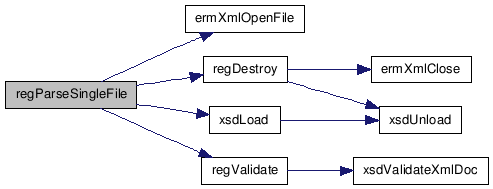
| gboolean regRemoveNetworkConfig | ( | regRegistry_t * | pRegistry | ) |
Definition at line 3166 of file erregxml.c.
03167 { 03168 ERREG_LOGPRINTF("entry %p", pRegistry); 03169 g_assert(pRegistry); 03170 g_assert(pRegistry->xpaths); 03171 g_assert(pRegistry->xpaths->networkProfiles); 03172 03173 char xpath[BUF_LEN + 1]; 03174 int nLen, nRet; 03175 03176 erManifest *pXmlCxt = &(pRegistry->xmlCxt); 03177 03178 // xpath 03179 nLen = g_snprintf(xpath, BUF_LEN, "%s", pRegistry->xpaths->networkProfiles); 03180 nRet = ermXmlRemoveNode(pXmlCxt, xpath); 03181 if (RET_ERR == nRet) 03182 { 03183 return FALSE; 03184 } 03185 03186 return TRUE; 03187 }

| gboolean regRemoveNetworkProfile | ( | const char * | ID, | |
| regRegistry_t * | pRegistry | |||
| ) |
Definition at line 3142 of file erregxml.c.
03143 { 03144 ERREG_LOGPRINTF("entry %p", pRegistry); 03145 g_assert(ID); 03146 g_assert(pRegistry); 03147 g_assert(pRegistry->xpaths); 03148 g_assert(pRegistry->xpaths->networkProfile); 03149 03150 char xpath[BUF_LEN + 1]; 03151 int nLen, nRet; 03152 03153 erManifest *pXmlCxt = &(pRegistry->xmlCxt); 03154 03155 // xpath 03156 nLen = g_snprintf(xpath, BUF_LEN, "%s[@%s=\"%s\"]", pRegistry->xpaths->networkProfile, ATTR_PROFILE_ID, ID); 03157 nRet = ermXmlRemoveNode(pXmlCxt, xpath); 03158 if (RET_ERR == nRet) 03159 { 03160 return FALSE; 03161 } 03162 03163 return TRUE; 03164 }

| gboolean regRemovePCConfig | ( | regRegistry_t * | pRegistry | ) |
Definition at line 1032 of file erregxml.c.
01033 { 01034 ERREG_LOGPRINTF("entry %p", pRegistry); 01035 g_assert(pRegistry); 01036 g_assert(pRegistry->xpaths); 01037 g_assert(pRegistry->xpaths->pcProfiles); 01038 01039 char xpath[BUF_LEN + 1]; 01040 int nLen, nRet; 01041 01042 erManifest *pXmlCxt = &(pRegistry->xmlCxt); 01043 01044 // xpath 01045 nLen = g_snprintf(xpath, BUF_LEN, "%s", pRegistry->xpaths->pcProfiles); 01046 nRet = ermXmlRemoveNode(pXmlCxt, xpath); 01047 if (RET_ERR == nRet) 01048 { 01049 return FALSE; 01050 } 01051 01052 return TRUE; 01053 }

| gboolean regRemovePCProfile | ( | const char * | ID, | |
| regRegistry_t * | pRegistry | |||
| ) |
Definition at line 1008 of file erregxml.c.
01009 { 01010 ERREG_LOGPRINTF("entry %s %p", ID, pRegistry); 01011 g_assert(ID); 01012 g_assert(pRegistry); 01013 g_assert(pRegistry->xpaths); 01014 g_assert(pRegistry->xpaths->pcProfile); 01015 01016 char xpath[BUF_LEN + 1]; 01017 int nLen, nRet; 01018 01019 erManifest *pXmlCxt = &(pRegistry->xmlCxt); 01020 01021 // xpath 01022 nLen = g_snprintf(xpath, BUF_LEN, "%s[@%s=\"%s\"]", pRegistry->xpaths->pcProfile, ATTR_PROFILE_ID, ID); 01023 nRet = ermXmlRemoveNode(pXmlCxt, xpath); 01024 if (RET_ERR == nRet) 01025 { 01026 return FALSE; 01027 } 01028 01029 return TRUE; 01030 }

| gboolean regRemoveTimeSet | ( | regRegistry_t * | pRegistry | ) |
Definition at line 1336 of file erregxml.c.
01337 { 01338 ERREG_LOGPRINTF("entry %p", pRegistry); 01339 g_assert(pRegistry); 01340 g_assert(pRegistry->xpaths); 01341 g_assert(pRegistry->xpaths->autoConnect); 01342 01343 char xpath[BUF_LEN + 1]; 01344 01345 erManifest *pXmlCxt = &(pRegistry->xmlCxt); 01346 01347 // xpath 01348 g_snprintf(xpath, BUF_LEN, "%s/%s/%s", pRegistry->xpaths->autoConnect, EL_TIMED_IDS, EL_TIMESET); 01349 if (ermXmlRemoveNode(pXmlCxt, xpath) == RET_ERR) 01350 { 01351 return FALSE; 01352 } 01353 01354 return TRUE; 01355 }

| gboolean regSetAutoConnect | ( | const regAutoConnect_t * | theAutoConnect, | |
| regRegistry_t * | pRegistry | |||
| ) |
Definition at line 1181 of file erregxml.c.
01182 { 01183 ERREG_LOGPRINTF("entry %p %p", theAutoConnect, pRegistry); 01184 g_assert(theAutoConnect); 01185 g_assert(pRegistry); 01186 g_assert(pRegistry->xpaths); 01187 g_assert(pRegistry->xpaths->autoConnect); 01188 01189 regDumpAutoConnect(theAutoConnect); 01190 01191 char xpath[BUF_LEN + 1], szTmp[BUF_LEN + 1]; 01192 int nLen, nRet; 01193 01194 erManifest *pXmlCxt = &(pRegistry->xmlCxt); 01195 01196 // connect to which server 01197 regServerTypeToString(theAutoConnect->backgroundConnectTo, szTmp, BUF_LEN); 01198 nLen = g_snprintf(xpath, BUF_LEN, "%s/%s", pRegistry->xpaths->autoConnect, EL_SERVER_TYPE); 01199 nRet = ermXmlCheckXpath(pXmlCxt, xpath); 01200 if (RET_OK == nRet) 01201 { 01202 nRet = ermXmlSetString(pXmlCxt, xpath, szTmp); 01203 } 01204 if (RET_ERR == nRet) 01205 { 01206 return FALSE; 01207 } 01208 01209 // backgroundEnable 01210 nLen = g_snprintf(xpath, BUF_LEN, "%s/%s/%s", pRegistry->xpaths->autoConnect, EL_BACKGOUND, EL_ENABLE); 01211 nRet = ermXmlCheckXpath(pXmlCxt, xpath); 01212 if (RET_OK == nRet) 01213 { 01214 nRet = ermXmlSetBoolean(pXmlCxt, xpath, theAutoConnect->backgroundEnable); 01215 } 01216 if (RET_ERR == nRet) 01217 { 01218 return FALSE; 01219 } 01220 01221 // backgroundInterval 01222 nLen = g_snprintf(xpath, BUF_LEN, "%s/%s/%s", pRegistry->xpaths->autoConnect, EL_BACKGOUND, EL_INTERVAL); 01223 nRet = ermXmlCheckXpath(pXmlCxt, xpath); 01224 if (RET_OK == nRet) 01225 { 01226 nRet = ermXmlSetInt(pXmlCxt, xpath, theAutoConnect->backgroundInterval); 01227 } 01228 if (RET_ERR == nRet) 01229 { 01230 return FALSE; 01231 } 01232 01233 pRegistry->changed = TRUE; 01234 return TRUE; 01235 }
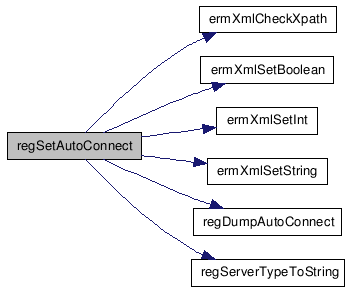
| gboolean regSetAutoConnectWlan | ( | gboolean | enable, | |
| regRegistry_t * | pRegistry | |||
| ) |
Definition at line 3389 of file erregxml.c.
03390 { 03391 ERREG_LOGPRINTF("entry %p", pRegistry); 03392 g_assert(pRegistry); 03393 g_assert(pRegistry->xpaths); 03394 g_assert(pRegistry->xpaths->autoConnectWlan); 03395 03396 regDumpAutoConnectWlan(enable); 03397 03398 erManifest *pXmlCxt = &(pRegistry->xmlCxt); 03399 char *xpath = pRegistry->xpaths->autoConnectWlan; 03400 int nRet = ermXmlCheckXpath(pXmlCxt, xpath); 03401 if (RET_OK == nRet) 03402 { 03403 nRet = ermXmlSetBoolean(pXmlCxt, xpath, enable); 03404 } 03405 if (RET_ERR == nRet) 03406 { 03407 return FALSE; 03408 } 03409 03410 pRegistry->changed = TRUE; 03411 return TRUE; 03412 }
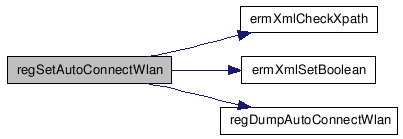
| gboolean regSetContentCategory | ( | const char * | ID, | |
| const regContentCategory_t * | theContentCategory, | |||
| regRegistry_t * | pRegistry | |||
| ) |
Definition at line 1497 of file erregxml.c.
01498 { 01499 ERREG_LOGPRINTF("%s %p %p", ID, theContentCategory, pRegistry); 01500 g_assert(ID); 01501 g_assert(theContentCategory); 01502 g_assert(pRegistry); 01503 g_assert(pRegistry->xpaths); 01504 g_assert(pRegistry->xpaths->category); 01505 01506 regDumpContentCategory(ID, theContentCategory); 01507 01508 char xpath[BUF_LEN + 1], xpathExt[BUF_LEN + 1]; 01509 int nLen, nRet; 01510 01511 erManifest *pXmlCxt = &(pRegistry->xmlCxt); 01512 01513 nLen = g_snprintf(xpath, BUF_LEN, "%s[@%s=\"%s\"]", pRegistry->xpaths->category, ATTR_TYPE, ID); 01514 01515 if (theContentCategory->location) 01516 { 01517 nLen = g_snprintf(xpathExt, BUF_LEN, "%s/%s", xpath, EL_LOCATION); 01518 nRet = ermXmlCheckXpath(pXmlCxt, xpathExt); 01519 if (RET_OK == nRet) 01520 { 01521 nRet = ermXmlSetString(pXmlCxt, xpathExt, theContentCategory->location); 01522 } 01523 if (RET_ERR == nRet) 01524 { 01525 return FALSE; 01526 } 01527 } 01528 01529 if (theContentCategory->sortFieldType) 01530 { 01531 nLen = g_snprintf(xpathExt, BUF_LEN, "%s/%s/%s", xpath, EL_SORT, EL_SORT_FIELD_TYPE); 01532 nRet = ermXmlCheckXpath(pXmlCxt, xpathExt); 01533 if (RET_OK == nRet) 01534 { 01535 nRet = ermXmlSetString(pXmlCxt, xpathExt, theContentCategory->sortFieldType); 01536 } 01537 if (RET_ERR == nRet) 01538 { 01539 return FALSE; 01540 } 01541 } 01542 01543 nLen = g_snprintf(xpathExt, BUF_LEN, "%s/%s/%s", xpath, EL_SORT, EL_SORT_ASCENDING); 01544 nRet = ermXmlCheckXpath(pXmlCxt, xpathExt); 01545 if (RET_OK == nRet) 01546 { 01547 nRet = ermXmlSetBoolean(pXmlCxt, xpathExt, theContentCategory->sortAscending); 01548 } 01549 if (RET_ERR == nRet) 01550 { 01551 return FALSE; 01552 } 01553 01554 pRegistry->changed = TRUE; 01555 return TRUE; 01556 }
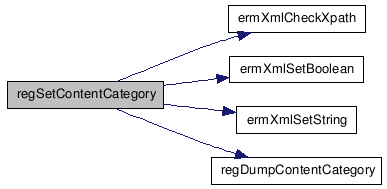
| gboolean regSetDeviceDetails | ( | const deviceDetails_t * | theDeviceDetails, | |
| regRegistry_t * | pRegistry | |||
| ) |
Definition at line 3550 of file erregxml.c.
03551 { 03552 ERREG_LOGPRINTF("entry %p %p", theDeviceDetails, pRegistry); 03553 g_assert(theDeviceDetails); 03554 g_assert(pRegistry); 03555 g_assert(pRegistry->xpaths); 03556 g_assert(pRegistry->xpaths->deviceDetails); 03557 03558 regDumpDeviceDetails(theDeviceDetails); 03559 03560 char xpath[BUF_LEN + 1]; 03561 int nLen, nRet; 03562 03563 erManifest *pXmlCxt = &(pRegistry->xmlCxt); 03564 03565 // software 03566 if (theDeviceDetails->software) 03567 { 03568 // buildName 03569 if (theDeviceDetails->software->szBuildName) 03570 { 03571 nLen = g_snprintf(xpath, BUF_LEN, "%s/%s/%s", pRegistry->xpaths->deviceDetails, EL_SOFTWARE, EL_BUILD_NAME); 03572 nRet = ermXmlCheckXpath(pXmlCxt, xpath); 03573 if (RET_OK == nRet) 03574 { 03575 nRet = ermXmlSetString(pXmlCxt, xpath, theDeviceDetails->software->szBuildName); 03576 } 03577 03578 if (RET_ERR == nRet) 03579 { 03580 return FALSE; 03581 } 03582 } 03583 03584 // buildNum 03585 if (theDeviceDetails->software->szBuildNum) 03586 { 03587 nLen = g_snprintf(xpath, BUF_LEN, "%s/%s/%s", pRegistry->xpaths->deviceDetails, EL_SOFTWARE, EL_BUILD_NUM); 03588 nRet = ermXmlCheckXpath(pXmlCxt, xpath); 03589 if (RET_OK == nRet) 03590 { 03591 nRet = ermXmlSetString(pXmlCxt, xpath, theDeviceDetails->software->szBuildNum); 03592 } 03593 03594 if (RET_ERR == nRet) 03595 { 03596 return FALSE; 03597 } 03598 } 03599 } 03600 03601 // szMacOfWired 03602 if (theDeviceDetails->szMacOfWired) 03603 { 03604 nLen = g_snprintf(xpath, BUF_LEN, "%s/%s", pRegistry->xpaths->deviceDetails, EL_MAC_OF_WIRED); 03605 nRet = ermXmlCheckXpath(pXmlCxt, xpath); 03606 if (RET_OK == nRet) 03607 { 03608 nRet = ermXmlSetString(pXmlCxt, xpath, theDeviceDetails->szMacOfWired); 03609 } 03610 03611 if (RET_ERR == nRet) 03612 { 03613 return FALSE; 03614 } 03615 } 03616 03617 // szMacOfWireless 03618 if (theDeviceDetails->szMacOfWireless) 03619 { 03620 nLen = g_snprintf(xpath, BUF_LEN, "%s/%s", pRegistry->xpaths->deviceDetails, EL_MAC_OF_WIRELESS); 03621 nRet = ermXmlCheckXpath(pXmlCxt, xpath); 03622 if (RET_OK == nRet) 03623 { 03624 nRet = ermXmlSetString(pXmlCxt, xpath, theDeviceDetails->szMacOfWireless); 03625 } 03626 03627 if (RET_ERR == nRet) 03628 { 03629 return FALSE; 03630 } 03631 } 03632 03633 // szPublicKey 03634 if (theDeviceDetails->szPublicKey) 03635 { 03636 nLen = g_snprintf(xpath, BUF_LEN, "%s/%s", pRegistry->xpaths->deviceDetails, EL_PUBLIC_KEY); 03637 nRet = ermXmlCheckXpath(pXmlCxt, xpath); 03638 if (RET_OK == nRet) 03639 { 03640 nRet = ermXmlSetString(pXmlCxt, xpath, theDeviceDetails->szPublicKey); 03641 } 03642 03643 if (RET_ERR == nRet) 03644 { 03645 return FALSE; 03646 } 03647 } 03648 03649 pRegistry->changed = TRUE; 03650 return TRUE; 03651 }
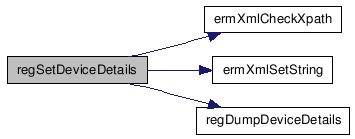
| gboolean regSetExportMemType | ( | const regExportMemType_t * | theExportMemType, | |
| regRegistry_t * | pRegistry | |||
| ) |
Definition at line 1587 of file erregxml.c.
01588 { 01589 ERREG_LOGPRINTF("%p %p", theExportMemType, pRegistry); 01590 g_assert(theExportMemType); 01591 g_assert(pRegistry); 01592 g_assert(pRegistry->xpaths); 01593 g_assert(pRegistry->xpaths->usbExport); 01594 g_assert(theExportMemType); 01595 g_assert(theExportMemType->location); 01596 01597 regDumpExportMemType(theExportMemType); 01598 01599 erManifest *pXmlCxt = &(pRegistry->xmlCxt); 01600 01601 if (RET_ERR == ermXmlCheckXpath(pXmlCxt, pRegistry->xpaths->usbExport)) 01602 { 01603 return FALSE; 01604 } 01605 if (RET_ERR == ermXmlSetString(pXmlCxt, pRegistry->xpaths->usbExport, theExportMemType->location)) 01606 { 01607 return FALSE; 01608 } 01609 01610 pRegistry->changed = TRUE; 01611 return TRUE; 01612 }
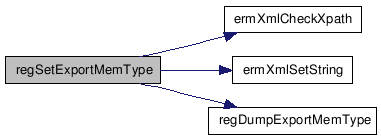
| gboolean regSetLastConnect | ( | const regLastConnect_t * | theLastConnect, | |
| regRegistry_t * | pRegistry | |||
| ) |
Definition at line 3312 of file erregxml.c.
03313 { 03314 ERREG_LOGPRINTF("entry %p %p", theLastConnect, pRegistry); 03315 g_assert(theLastConnect); 03316 g_assert(pRegistry); 03317 g_assert(pRegistry->xpaths); 03318 g_assert(pRegistry->xpaths->lastConnect); 03319 03320 regDumpLastConnect(theLastConnect); 03321 03322 char xpath[BUF_LEN + 1], szTmp[BUF_LEN + 1]; 03323 int nLen, nRet = RET_OK; 03324 03325 erManifest *pXmlCxt = &(pRegistry->xmlCxt); 03326 03327 // profileConnectedIDS 03328 nLen = g_snprintf(xpath, BUF_LEN, "%s/%s", pRegistry->xpaths->lastConnect, EL_PROFILE_CONNECTED_IDS); 03329 nRet = ermXmlCheckXpath(pXmlCxt, xpath); 03330 if (RET_OK == nRet) 03331 { 03332 nRet = ermXmlSetInt(pXmlCxt, xpath, theLastConnect->profileConnectedIDS); 03333 } 03334 if (RET_ERR == nRet) 03335 { 03336 return FALSE; 03337 } 03338 03339 // profileConnectedPC 03340 nLen = g_snprintf(xpath, BUF_LEN, "%s/%s", pRegistry->xpaths->lastConnect, EL_PROFILE_CONNECTED_PC); 03341 nRet = ermXmlCheckXpath(pXmlCxt, xpath); 03342 if (RET_OK == nRet) 03343 { 03344 nRet = ermXmlSetInt(pXmlCxt, xpath, theLastConnect->profileConnectedPC); 03345 } 03346 if (RET_ERR == nRet) 03347 { 03348 return FALSE; 03349 } 03350 03351 // connect to which server 03352 regServerTypeToString(theLastConnect->manualConnectType, szTmp, BUF_LEN); 03353 nLen = g_snprintf(xpath, BUF_LEN, "%s/%s", pRegistry->xpaths->lastConnect, EL_MANUAL_CONNECT_TYPE); 03354 nRet = ermXmlCheckXpath(pXmlCxt, xpath); 03355 if (RET_OK == nRet) 03356 { 03357 nRet = ermXmlSetString(pXmlCxt, xpath, szTmp); 03358 } 03359 if (RET_ERR == nRet) 03360 { 03361 return FALSE; 03362 } 03363 03364 pRegistry->changed = TRUE; 03365 return TRUE; 03366 }
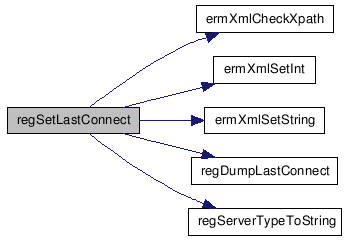
| gboolean regSetLastRead | ( | const char * | ID, | |
| const regLastRead_t * | theLastRead, | |||
| regRegistry_t * | pRegistry | |||
| ) |
Definition at line 1686 of file erregxml.c.
01687 { 01688 ERREG_LOGPRINTF("entry %s %p %p", ID, theLastRead, pRegistry); 01689 g_assert(ID); 01690 g_assert(theLastRead); 01691 g_assert(pRegistry); 01692 g_assert(pRegistry->xpaths); 01693 g_assert(pRegistry->xpaths->lastRead); 01694 01695 regDumpLastRead(ID, theLastRead); 01696 01697 char xpath[BUF_LEN + 1], xpathExt[BUF_LEN + 1]; 01698 int nLen, nRet; 01699 01700 erManifest *pXmlCxt = &(pRegistry->xmlCxt); 01701 01702 nLen = g_snprintf(xpath, BUF_LEN, "%s[@%s=\"%s\"]", pRegistry->xpaths->lastRead, ATTR_TYPE, ID); 01703 01704 if (theLastRead->extension) 01705 { 01706 nLen = g_snprintf(xpathExt, BUF_LEN, "%s/%s", xpath, EL_EXT_NAME); 01707 nRet = ermXmlCheckXpath(pXmlCxt, xpathExt); 01708 if (RET_OK == nRet) 01709 { 01710 nRet = ermXmlSetString(pXmlCxt, xpathExt, theLastRead->extension); 01711 } 01712 if (RET_ERR == nRet) 01713 { 01714 return FALSE; 01715 } 01716 } 01717 01718 if (theLastRead->documentPath) 01719 { 01720 nLen = g_snprintf(xpathExt, BUF_LEN, "%s/%s", xpath, EL_DOCUMENT_PATH); 01721 nRet = ermXmlCheckXpath(pXmlCxt, xpathExt); 01722 if (RET_OK == nRet) 01723 { 01724 nRet = ermXmlSetString(pXmlCxt, xpathExt, theLastRead->documentPath); 01725 } 01726 if (RET_ERR == nRet) 01727 { 01728 return FALSE; 01729 } 01730 } 01731 01732 if (theLastRead->manifestPath) 01733 { 01734 nLen = g_snprintf(xpathExt, BUF_LEN, "%s/%s", xpath, EL_MANIFEST_PATH); 01735 nRet = ermXmlCheckXpath(pXmlCxt, xpathExt); 01736 if (RET_OK == nRet) 01737 { 01738 nRet = ermXmlSetString(pXmlCxt, xpathExt, theLastRead->manifestPath); 01739 } 01740 if (RET_ERR == nRet) 01741 { 01742 return FALSE; 01743 } 01744 } 01745 01746 if (theLastRead->position) 01747 { 01748 nLen = g_snprintf(xpathExt, BUF_LEN, "%s/%s", xpath, EL_POSITION); 01749 nRet = ermXmlCheckXpath(pXmlCxt, xpathExt); 01750 if (RET_OK == nRet) 01751 { 01752 nRet = ermXmlSetString(pXmlCxt, xpathExt, theLastRead->position); 01753 } 01754 if (RET_ERR == nRet) 01755 { 01756 return FALSE; 01757 } 01758 } 01759 01760 pRegistry->changed = TRUE; 01761 return TRUE; 01762 }
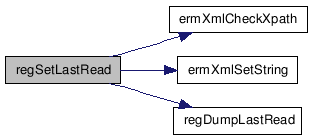
| gboolean regSetNetworkConfig | ( | const regNetworkConfig_t * | theNetworkConfig, | |
| regRegistry_t * | pRegistry | |||
| ) |
Definition at line 2544 of file erregxml.c.
02545 { 02546 ERREG_LOGPRINTF("entry %p %p", theNetworkConfig, pRegistry); 02547 g_assert(theNetworkConfig); 02548 g_assert(pRegistry); 02549 g_assert(pRegistry->xpaths); 02550 g_assert(pRegistry->xpaths->networkProfile); 02551 02552 regDumpNetworkConfig(theNetworkConfig); 02553 02554 char xpath[BUF_LEN + 1]; 02555 int nLen, i, nProfiles, nRet; 02556 02557 erManifest *pXmlCxt = &(pRegistry->xmlCxt); 02558 02559 nProfiles = theNetworkConfig->size; 02560 for (i = 1; i <= nProfiles; i++) 02561 { 02562 nLen = g_snprintf(xpath, BUF_LEN, "%s[%d]", pRegistry->xpaths->networkProfile, i); 02563 nRet = ermXmlCheckXpath(pXmlCxt, xpath); 02564 if (RET_OK == nRet) 02565 { 02566 nRet = ermXmlSetAttributeString(pXmlCxt, xpath, ATTR_PROFILE_ID, 02567 theNetworkConfig->networkList[i-1], 02568 strlen(theNetworkConfig->networkList[i-1])); 02569 } 02570 if (RET_ERR == nRet) 02571 { 02572 return FALSE; 02573 } 02574 } 02575 02576 pRegistry->changed = TRUE; 02577 return TRUE; 02578 }
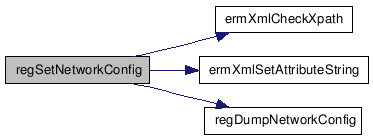
| gboolean regSetNetworkProfile | ( | const char * | ID, | |
| const regNetworkProfile_t * | theNetworkProfile, | |||
| regRegistry_t * | pRegistry | |||
| ) |
Definition at line 3009 of file erregxml.c.
03010 { 03011 ERREG_LOGPRINTF("entry %s %p %p", ID, theNetworkProfile, pRegistry); 03012 g_assert(ID); 03013 g_assert(theNetworkProfile); 03014 g_assert(pRegistry); 03015 g_assert(pRegistry->xpaths); 03016 g_assert(pRegistry->xpaths->networkProfile); 03017 03018 regDumpNetworkProfile(ID, theNetworkProfile); 03019 03020 char xpath[BUF_LEN + 1], szTmp[BUF_LEN + 1], xpathExt[BUF_LEN + 1]; 03021 int nLen, nRet; 03022 gboolean bDhcp, bRet; 03023 03024 erManifest *pXmlCxt = &(pRegistry->xmlCxt); 03025 03026 if (FALSE == regChkNetworkProfile(theNetworkProfile)) 03027 { 03028 return FALSE; 03029 } 03030 03031 // xpath 03032 nLen = g_snprintf(xpath, BUF_LEN, "%s[@%s=\"%s\"]", pRegistry->xpaths->networkProfile, ATTR_PROFILE_ID, ID); 03033 03034 // profile name 03035 nLen = g_snprintf(xpathExt, BUF_LEN, "%s/%s", xpath, EL_PROFILE_NAME); 03036 nRet = ermXmlCheckXpath(pXmlCxt, xpathExt); 03037 if (RET_OK == nRet) 03038 { 03039 nRet = ermXmlSetString(pXmlCxt, xpathExt, theNetworkProfile->name); 03040 } 03041 if (RET_ERR == nRet) 03042 { 03043 return FALSE; 03044 } 03045 03046 // networkType 03047 regNetworkTypeToString(theNetworkProfile->connection, szTmp, BUF_LEN); 03048 nLen = g_snprintf(xpathExt, BUF_LEN, "%s/%s", xpath, EL_NETWORK_TYPE); 03049 nRet = ermXmlCheckXpath(pXmlCxt, xpathExt); 03050 if (RET_OK == nRet) 03051 { 03052 nRet = ermXmlSetString(pXmlCxt, xpathExt, szTmp); 03053 } 03054 if (RET_ERR == nRet) 03055 { 03056 return FALSE; 03057 } 03058 03059 // useProxy 03060 nLen = g_snprintf(xpathExt, BUF_LEN, "%s/%s", xpath, EL_USE_PROXY); 03061 nRet = ermXmlCheckXpath(pXmlCxt, xpathExt); 03062 if (RET_OK == nRet) 03063 { 03064 nRet = ermXmlSetBoolean(pXmlCxt, xpathExt, theNetworkProfile->proxy); 03065 } 03066 if (RET_ERR == nRet) 03067 { 03068 return FALSE; 03069 } 03070 03071 // userDhcp 03072 nLen = g_snprintf(xpathExt, BUF_LEN, "%s/%s", xpath, EL_USE_DHCP); 03073 bDhcp = regIpAddressToBool(theNetworkProfile->addressMode); 03074 nRet = ermXmlCheckXpath(pXmlCxt, xpathExt); 03075 if (RET_OK == nRet) 03076 { 03077 nRet = ermXmlSetBoolean(pXmlCxt, xpathExt, bDhcp); 03078 } 03079 if (RET_ERR == nRet) 03080 { 03081 return FALSE; 03082 } 03083 03084 if (theNetworkProfile->connection == wireless_t) 03085 { 03086 // wireless settings 03087 bRet = setWirelessSettings(pRegistry, xpath, theNetworkProfile->wirelessSettings); 03088 if (FALSE == bRet) 03089 { 03090 return FALSE; 03091 } 03092 } 03093 else if (theNetworkProfile->connection == dialup_t) 03094 { 03095 // dialup settings 03096 bRet = setDialupSettings(pRegistry, xpath, theNetworkProfile->dialupSettings); 03097 if (FALSE == bRet) 03098 { 03099 return FALSE; 03100 } 03101 } 03102 03103 // proxy settings 03104 if (theNetworkProfile->proxy == TRUE) 03105 { 03106 bRet = setProxySettings(pRegistry, xpath, theNetworkProfile->proxySettings); 03107 if (FALSE == bRet) 03108 { 03109 return FALSE; 03110 } 03111 } 03112 03113 // IP settings 03114 if (theNetworkProfile->addressMode == static_t) 03115 { 03116 bRet = setIpSettings(pRegistry, xpath, theNetworkProfile->ipSettings); 03117 if (FALSE == bRet) 03118 { 03119 return FALSE; 03120 } 03121 } 03122 03123 // timestamp 03124 if (theNetworkProfile->timestamp != 0) 03125 { 03126 nLen = g_snprintf(xpathExt, BUF_LEN, "%s/%s", xpath, EL_TIMESTAMP); 03127 nRet = ermXmlCheckXpath(pXmlCxt, xpathExt); 03128 if (RET_OK == nRet) 03129 { 03130 nRet = ermXmlSetInt(pXmlCxt, xpathExt, theNetworkProfile->timestamp); 03131 } 03132 if (RET_ERR == nRet) 03133 { 03134 return FALSE; 03135 } 03136 } 03137 03138 pRegistry->changed = TRUE; 03139 return TRUE; 03140 }
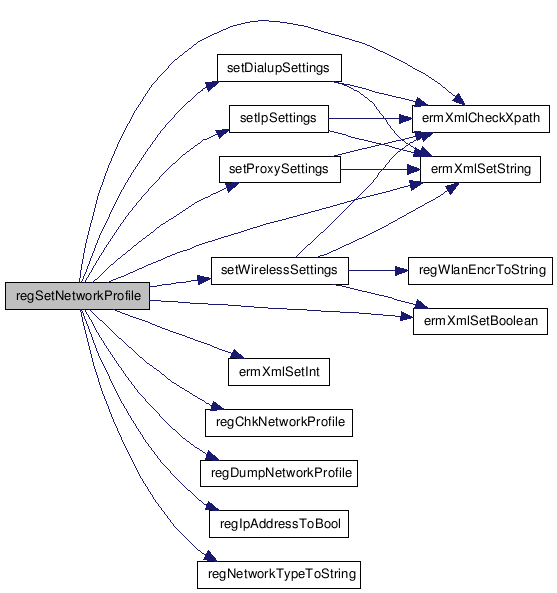
| gboolean regSetNetworkProfiles | ( | const regNetworkConfig_t * | theNetworkConfig, | |
| const regNetworkProfile_t ** | theNetworks, | |||
| regRegistry_t * | pRegistry | |||
| ) |
Definition at line 3228 of file erregxml.c.
03229 { 03230 ERREG_LOGPRINTF("entry"); 03231 g_assert(theNetworkConfig); 03232 g_assert(theNetworks); 03233 g_assert(pRegistry); 03234 03235 gboolean bRet = TRUE; // TRUE = ok 03236 gboolean b; 03237 int i; 03238 03239 // remove the ones 03240 regRemoveNetworkConfig(pRegistry); 03241 // set the new ones 03242 regSetNetworkConfig(theNetworkConfig, pRegistry); 03243 for (i = 0; i < theNetworkConfig->size; i++) 03244 { 03245 b = regSetNetworkProfile(theNetworkConfig->networkList[i], theNetworks[i], pRegistry); 03246 if (FALSE == b) 03247 { 03248 bRet = FALSE; 03249 } 03250 } 03251 03252 if (bRet) 03253 { 03254 pRegistry->changed = TRUE; 03255 } 03256 return TRUE; 03257 }
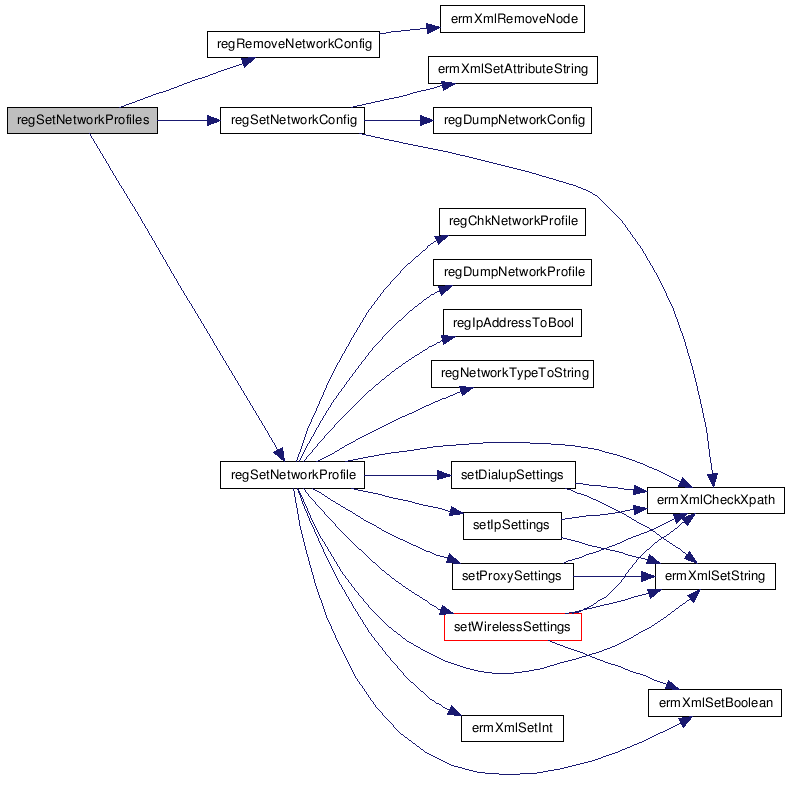
| gboolean regSetPCConfig | ( | const regPCConfig_t * | thePCConfig, | |
| regRegistry_t * | pRegistry | |||
| ) |
Definition at line 759 of file erregxml.c.
00760 { 00761 ERREG_LOGPRINTF("entry %p %p", thePCConfig, pRegistry); 00762 g_assert(thePCConfig); 00763 g_assert(pRegistry); 00764 g_assert(pRegistry->xpaths); 00765 g_assert(pRegistry->xpaths->pcProfile); 00766 00767 regDumpPCConfig(thePCConfig); 00768 00769 char xpath[BUF_LEN + 1]; 00770 int nLen, i, nProfiles, nRet; 00771 00772 erManifest *pXmlCxt = &(pRegistry->xmlCxt); 00773 00774 nProfiles = thePCConfig->size; 00775 for (i = 1; i <= nProfiles; i++) 00776 { 00777 nLen = g_snprintf(xpath, BUF_LEN, "%s[%d]", pRegistry->xpaths->pcProfile, i); 00778 nRet = ermXmlCheckXpath(pXmlCxt, xpath); 00779 if (RET_OK == nRet) 00780 { 00781 nRet = ermXmlSetAttributeString(pXmlCxt, xpath, ATTR_PROFILE_ID, 00782 thePCConfig->pcList[i - 1], strlen(thePCConfig->pcList[i - 1])); 00783 } 00784 if (RET_ERR == nRet) 00785 { 00786 return FALSE; 00787 } 00788 } 00789 00790 pRegistry->changed = TRUE; 00791 return TRUE; 00792 }
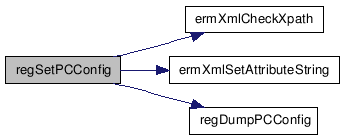
| gboolean regSetPCProfile | ( | const char * | ID, | |
| const regPCProfile_t * | thePCProfile, | |||
| regRegistry_t * | pRegistry | |||
| ) |
Definition at line 888 of file erregxml.c.
00889 { 00890 ERREG_LOGPRINTF("entry %s %p %p", ID, thePCProfile, pRegistry); 00891 g_assert(ID); 00892 g_assert(thePCProfile); 00893 g_assert(pRegistry); 00894 g_assert(pRegistry->xpaths); 00895 g_assert(pRegistry->xpaths->pcProfile); 00896 00897 regDumpPCProfile(ID, thePCProfile); 00898 00899 char xpath[BUF_LEN + 1], xpathExt[BUF_LEN + 1]; 00900 int nLen, nRet; 00901 00902 erManifest *pXmlCxt = &(pRegistry->xmlCxt); 00903 00904 // check if relevant values are present before adding them to the registry file 00905 if ((thePCProfile->pcname == NULL) || (thePCProfile->sharename == NULL)) 00906 { 00907 ERREG_WARNPRINTF("Some fields in thePCProfile shouldn't containis NULL."); 00908 return FALSE; 00909 } 00910 00911 // xpath 00912 nLen = g_snprintf(xpath, BUF_LEN, "%s[@%s=\"%s\"]", pRegistry->xpaths->pcProfile, ATTR_PROFILE_ID, ID); 00913 00914 // profile name 00915 if (thePCProfile->name) 00916 { 00917 nLen = g_snprintf(xpathExt, BUF_LEN, "%s/%s", xpath, EL_PROFILE_NAME); 00918 nRet = ermXmlCheckXpath(pXmlCxt, xpathExt); 00919 if (RET_OK == nRet) 00920 { 00921 nRet = ermXmlSetString(pXmlCxt, xpathExt, thePCProfile->name); 00922 } 00923 if (RET_ERR == nRet) 00924 { 00925 return FALSE; 00926 } 00927 } 00928 00929 // pcname 00930 if (thePCProfile->pcname) 00931 { 00932 nLen = g_snprintf(xpathExt, BUF_LEN, "%s/%s", xpath, EL_PC_NAME); 00933 nRet = ermXmlCheckXpath(pXmlCxt, xpathExt); 00934 if (RET_OK == nRet) 00935 { 00936 nRet = ermXmlSetString(pXmlCxt, xpathExt, thePCProfile->pcname); 00937 } 00938 if (RET_ERR == nRet) 00939 { 00940 return FALSE; 00941 } 00942 } 00943 00944 // sharename 00945 if (thePCProfile->sharename) 00946 { 00947 nLen = g_snprintf(xpathExt, BUF_LEN, "%s/%s", xpath, EL_SHARE_NAME); 00948 nRet = ermXmlCheckXpath(pXmlCxt, xpathExt); 00949 if (RET_OK == nRet) 00950 { 00951 nRet = ermXmlSetString(pXmlCxt, xpathExt, thePCProfile->sharename); 00952 } 00953 if (RET_ERR == nRet) 00954 { 00955 return FALSE; 00956 } 00957 } 00958 00959 // workgroup 00960 if (thePCProfile->workgroup) 00961 { 00962 nLen = g_snprintf(xpathExt, BUF_LEN, "%s/%s", xpath, EL_WORKGROUP); 00963 nRet = ermXmlCheckXpath(pXmlCxt, xpathExt); 00964 if (RET_OK == nRet) 00965 { 00966 nRet = ermXmlSetString(pXmlCxt, xpathExt, thePCProfile->workgroup); 00967 } 00968 if (RET_ERR == nRet) 00969 { 00970 return FALSE; 00971 } 00972 } 00973 00974 // username 00975 if (thePCProfile->username) 00976 { 00977 nLen = g_snprintf(xpathExt, BUF_LEN, "%s/%s", xpath, EL_USER_NAME); 00978 nRet = ermXmlCheckXpath(pXmlCxt, xpathExt); 00979 if (RET_OK == nRet) 00980 { 00981 nRet = ermXmlSetString(pXmlCxt, xpathExt, thePCProfile->username); 00982 } 00983 if (RET_ERR == nRet) 00984 { 00985 return FALSE; 00986 } 00987 } 00988 00989 // password 00990 if (thePCProfile->password) 00991 { 00992 nLen = g_snprintf(xpathExt, BUF_LEN, "%s/%s", xpath, EL_PASSWORD); 00993 nRet = ermXmlCheckXpath(pXmlCxt, xpathExt); 00994 if (RET_OK == nRet) 00995 { 00996 nRet = ermXmlSetString(pXmlCxt, xpathExt, thePCProfile->password); 00997 } 00998 if (RET_ERR == nRet) 00999 { 01000 return FALSE; 01001 } 01002 } 01003 01004 pRegistry->changed = TRUE; 01005 return TRUE; 01006 }
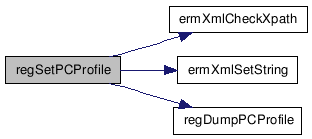
| gboolean regSetPCProfiles | ( | const regPCConfig_t * | thePCConfig, | |
| const regPCProfile_t ** | thePCs, | |||
| regRegistry_t * | pRegistry | |||
| ) |
Definition at line 1094 of file erregxml.c.
01095 { 01096 ERREG_LOGPRINTF("entry"); 01097 g_assert(thePCConfig); 01098 g_assert(thePCs); 01099 g_assert(pRegistry); 01100 01101 gboolean bRet = TRUE; // TRUE = ok 01102 gboolean b; 01103 int i; 01104 01105 // remove the ones 01106 regRemovePCConfig(pRegistry); 01107 01108 // set the new ones 01109 regSetPCConfig(thePCConfig, pRegistry); 01110 for (i = 0; i < thePCConfig->size; i++) 01111 { 01112 b = regSetPCProfile(thePCConfig->pcList[i], thePCs[i], pRegistry); 01113 if (FALSE == b) 01114 { 01115 bRet = FALSE; 01116 } 01117 } 01118 01119 if (bRet) 01120 { 01121 pRegistry->changed = TRUE; 01122 } 01123 return bRet; 01124 }
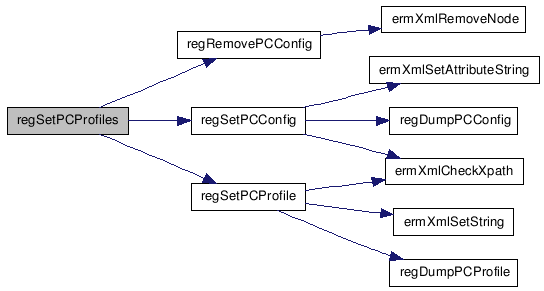
| gboolean regSetStartUp | ( | const regStartUp_t * | theStartUp, | |
| regRegistry_t * | pRegistry | |||
| ) |
Definition at line 2232 of file erregxml.c.
02233 { 02234 ERREG_LOGPRINTF("entry %p %p", theStartUp, pRegistry); 02235 g_assert(theStartUp); 02236 g_assert(pRegistry); 02237 g_assert(pRegistry->xpaths); 02238 g_assert(pRegistry->xpaths->startup); 02239 02240 regDumpStartUp(theStartUp); 02241 02242 char xpath[BUF_LEN + 1], szTmp[BUF_LEN + 1]; 02243 int nLen, nRet = RET_OK; 02244 02245 erManifest *pXmlCxt = &(pRegistry->xmlCxt); 02246 02247 // behaviour 02248 if ((theStartUp->behaviour >=0) && (theStartUp->behaviour < behaviourUndefined_t)) 02249 { 02250 regBehaviourToString(theStartUp->behaviour, szTmp, BUF_LEN); 02251 nLen = g_snprintf(xpath, BUF_LEN, "%s/%s", pRegistry->xpaths->startup, EL_BEHAVIOUR); 02252 nRet = ermXmlCheckXpath(pXmlCxt, xpath); 02253 if (RET_OK == nRet) 02254 { 02255 nRet = ermXmlSetString(pXmlCxt, xpath, szTmp); 02256 } 02257 if (RET_ERR == nRet) 02258 { 02259 return FALSE; 02260 } 02261 } 02262 02263 // documentPath 02264 if (theStartUp->documentPath) 02265 { 02266 nLen = g_snprintf(xpath, BUF_LEN, "%s/%s", pRegistry->xpaths->startup, EL_DOCUMENT_PATH); 02267 nRet = ermXmlCheckXpath(pXmlCxt, xpath); 02268 if (RET_OK == nRet) 02269 { 02270 nRet = ermXmlSetString(pXmlCxt, xpath, theStartUp->documentPath); 02271 } 02272 if (RET_ERR == nRet) 02273 { 02274 return FALSE; 02275 } 02276 } 02277 02278 pRegistry->changed = TRUE; 02279 return TRUE; 02280 }
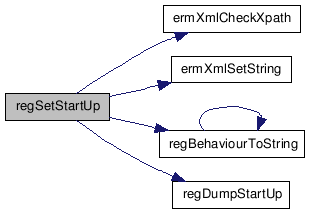
| gboolean regSetTimedIds | ( | regTimedIds_t * | theTimedIds, | |
| regRegistry_t * | pRegistry | |||
| ) |
Definition at line 1357 of file erregxml.c.
01358 { 01359 ERREG_LOGPRINTF("entry %p %p", theTimedIds, pRegistry); 01360 g_assert(theTimedIds); 01361 g_assert(pRegistry); 01362 g_assert(pRegistry->xpaths); 01363 g_assert(pRegistry->xpaths->autoConnect); 01364 01365 regDumpTimedIds(theTimedIds); 01366 01367 char xpath[BUF_LEN + 1], szTmp[BUF_LEN + 1]; 01368 01369 erManifest *pXmlCxt = &(pRegistry->xmlCxt); 01370 01371 // Enable timed-iDS connection or not 01372 g_snprintf(xpath, BUF_LEN, "%s/%s/%s", pRegistry->xpaths->autoConnect, EL_TIMED_IDS, EL_ENABLE_TIMEDIDS); 01373 if (RET_ERR == ermXmlCheckXpath(pXmlCxt, xpath)) 01374 { 01375 return FALSE; 01376 } 01377 if (RET_ERR == ermXmlSetBoolean(pXmlCxt, xpath, theTimedIds->enable)) 01378 { 01379 return FALSE; 01380 } 01381 01382 // Time set 01383 // Sort 01384 qsort(theTimedIds->timeSet, theTimedIds->timeCnt, sizeof(int), lt); 01385 // Remove duplicate items 01386 rmDup(theTimedIds->timeSet, &theTimedIds->timeCnt); 01387 01388 // Remove existing time set first 01389 regRemoveTimeSet(pRegistry); 01390 01391 int i, hh, mm, ss; 01392 for (i=0; i<theTimedIds->timeCnt; i++) 01393 { 01394 g_snprintf(xpath, BUF_LEN, "%s/%s/%s/%s[%d]", pRegistry->xpaths->autoConnect, EL_TIMED_IDS, EL_TIMESET, EL_TIME, i+1); 01395 01396 if (RET_ERR == ermXmlCheckXpath(pXmlCxt, xpath)) 01397 { 01398 return FALSE; 01399 } 01400 01401 hh = theTimedIds->timeSet[i] / 3600; 01402 mm = theTimedIds->timeSet[i] / 60 % 60; 01403 ss = theTimedIds->timeSet[i] % 60; 01404 snprintf(szTmp, BUF_LEN, "%02d:%02d:%02d", hh, mm, ss); 01405 01406 if (RET_ERR == ermXmlSetString(pXmlCxt, xpath, szTmp)) 01407 { 01408 return FALSE; 01409 } 01410 } 01411 01412 // Enable software updates while connected to iDS 01413 g_snprintf(xpath, BUF_LEN, "%s/%s/%s", pRegistry->xpaths->autoConnect, EL_TIMED_IDS, EL_ENABLE_SWUPDATE); 01414 if (RET_ERR == ermXmlCheckXpath(pXmlCxt, xpath)) 01415 { 01416 return FALSE; 01417 } 01418 if (RET_ERR == ermXmlSetBoolean(pXmlCxt, xpath, theTimedIds->swUpdate)) 01419 { 01420 return FALSE; 01421 } 01422 01423 // Switch off iLiad after waking iLiad up 01424 g_snprintf(xpath, BUF_LEN, "%s/%s/%s", pRegistry->xpaths->autoConnect, EL_TIMED_IDS, EL_ENABLE_SWITCHOFF); 01425 if (RET_ERR == ermXmlCheckXpath(pXmlCxt, xpath)) 01426 { 01427 return FALSE; 01428 } 01429 if (RET_ERR == ermXmlSetBoolean(pXmlCxt, xpath, theTimedIds->switchOff)) 01430 { 01431 return FALSE; 01432 } 01433 01434 pRegistry->changed = TRUE; 01435 return TRUE; 01436 }
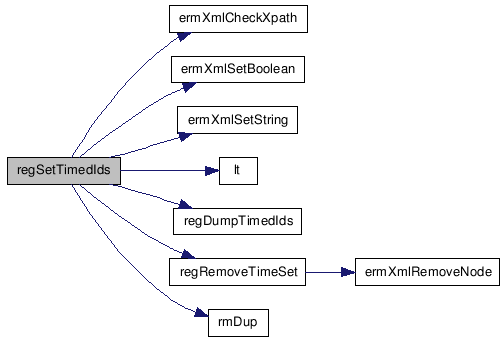
| gboolean regSetUserApp | ( | const char * | uaID, | |
| const regUserApp_t * | theUserApp, | |||
| regRegistry_t * | pRegistry | |||
| ) |
Definition at line 1917 of file erregxml.c.
01918 { 01919 ERREG_LOGPRINTF("entry %s %p %p", uaID, theUserApp, pRegistry); 01920 g_assert(uaID); 01921 g_assert(theUserApp); 01922 g_assert(pRegistry); 01923 g_assert(pRegistry->xpaths); 01924 g_assert(pRegistry->xpaths->application); 01925 01926 regDumpUserApp(uaID, theUserApp); 01927 01928 char xpath[BUF_LEN + 1], xpathExt[BUF_LEN + 1]; 01929 int nLen, nRet; 01930 01931 erManifest *pXmlCxt = &(pRegistry->xmlCxt); 01932 01933 nLen = g_snprintf(xpath, BUF_LEN, "%s[@%s=\"%s\"]", pRegistry->xpaths->application, ATTR_TYPE, uaID); 01934 01935 // appCategory 01936 nLen = g_snprintf(xpathExt, BUF_LEN, "%s/%s", xpath, EL_APP_CATEGORY); 01937 nRet = ermXmlCheckXpath(pXmlCxt, xpathExt); 01938 if (RET_OK == nRet) 01939 { 01940 nRet = ermXmlSetString(pXmlCxt, xpathExt, theUserApp->szCategory); 01941 } 01942 if (RET_ERR == nRet) 01943 { 01944 return FALSE; 01945 } 01946 01947 // szArgMask 01948 nLen = g_snprintf(xpathExt, BUF_LEN, "%s/%s", xpath, EL_ARG_MASK); 01949 nRet = ermXmlCheckXpath(pXmlCxt, xpathExt); 01950 if (RET_OK == nRet) 01951 { 01952 nRet = ermXmlSetString(pXmlCxt, xpathExt, theUserApp->szArgMask); 01953 } 01954 if (RET_ERR == nRet) 01955 { 01956 return FALSE; 01957 } 01958 01959 // szExec 01960 nLen = g_snprintf(xpathExt, BUF_LEN, "%s/%s", xpath, EL_EXECUTE); 01961 nRet = ermXmlCheckXpath(pXmlCxt, xpathExt); 01962 if (RET_OK == nRet) 01963 { 01964 nRet = ermXmlSetString(pXmlCxt, xpathExt, theUserApp->szExec); 01965 } 01966 if (RET_ERR == nRet) 01967 { 01968 return FALSE; 01969 } 01970 01971 // xResName 01972 nLen = g_snprintf(xpathExt, BUF_LEN, "%s/%s", xpath, EL_X_RES_NAME); 01973 nRet = ermXmlCheckXpath(pXmlCxt, xpathExt); 01974 if (RET_OK == nRet) 01975 { 01976 nRet = ermXmlSetString(pXmlCxt, xpathExt, theUserApp->xResName); 01977 } 01978 if (RET_ERR == nRet) 01979 { 01980 return FALSE; 01981 } 01982 01983 // ipcChannel 01984 nLen = g_snprintf(xpathExt, BUF_LEN, "%s/%s", xpath, EL_IPC_CHANNEL); 01985 nRet = ermXmlCheckXpath(pXmlCxt, xpathExt); 01986 if (RET_OK == nRet) 01987 { 01988 nRet = ermXmlSetInt(pXmlCxt, xpathExt, theUserApp->ipcChannel); 01989 } 01990 if (RET_ERR == nRet) 01991 { 01992 return FALSE; 01993 } 01994 01995 nLen = g_snprintf(xpathExt, BUF_LEN, "%s/%s", xpath, EL_APP_ICON_PATH); 01996 nRet = ermXmlCheckXpath(pXmlCxt, xpathExt); 01997 if (RET_OK == nRet) 01998 { 01999 nRet = ermXmlSetString(pXmlCxt, xpathExt, theUserApp->appIconPath); 02000 } 02001 if (RET_ERR == nRet) 02002 { 02003 return FALSE; 02004 } 02005 02006 // supportFormat 02007 if (theUserApp->extensionArray && theUserApp->extensionArraySize) 02008 { 02009 int i; 02010 02011 for (i = 1; i <= theUserApp->extensionArraySize; i++) 02012 { 02013 nLen = g_snprintf(xpathExt, BUF_LEN, "%s/%s/%s[%d]", xpath, EL_SUPPORT_FORMAT, EL_EXT_NAME, i); 02014 if (theUserApp->extensionArray[i - 1]) 02015 { 02016 nRet = ermXmlCheckXpath(pXmlCxt, xpathExt); 02017 if (RET_OK == nRet) 02018 { 02019 nRet = ermXmlSetString(pXmlCxt, xpathExt, theUserApp->extensionArray[i - 1]); 02020 } 02021 if (RET_ERR == nRet) 02022 { 02023 return FALSE; 02024 } 02025 } //if (theUserApp->extensionArray[i - 1]) 02026 } // for (i...) 02027 } // if (theUserApp->extensionArray ...) 02028 02029 pRegistry->changed = TRUE; 02030 return TRUE; 02031 }
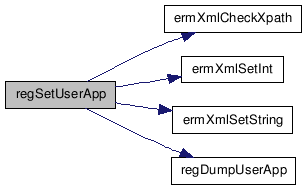
| gboolean regSetUserProfile | ( | const regUserProfile_t * | theUserProfile, | |
| regRegistry_t * | pRegistry | |||
| ) |
Definition at line 398 of file erregxml.c.
00399 { 00400 ERREG_LOGPRINTF("entry %p %p", theUserProfile, pRegistry); 00401 g_assert(theUserProfile); 00402 g_assert(pRegistry); 00403 g_assert(pRegistry->xpaths); 00404 g_assert(pRegistry->xpaths->userProfile); 00405 00406 regDumpUserProfile(theUserProfile); 00407 00408 char xpath[BUF_LEN + 1]; 00409 int nLen, nRet = RET_OK; 00410 00411 erManifest *pXmlCxt = &(pRegistry->xmlCxt); 00412 00413 // name 00414 if (theUserProfile->name) 00415 { 00416 nLen = g_snprintf(xpath, BUF_LEN, "%s/%s", pRegistry->xpaths->userProfile, EL_NAME); 00417 nRet = ermXmlCheckXpath(pXmlCxt, xpath); 00418 if (RET_OK == nRet) 00419 { 00420 nRet = ermXmlSetString(pXmlCxt, xpath, theUserProfile->name); 00421 } 00422 if (RET_ERR == nRet) 00423 { 00424 return FALSE; 00425 } 00426 } 00427 00428 // email 00429 if (theUserProfile->email) 00430 { 00431 nLen = g_snprintf(xpath, BUF_LEN, "%s/%s", pRegistry->xpaths->userProfile, EL_EMAIL); 00432 nRet = ermXmlCheckXpath(pXmlCxt, xpath); 00433 if (RET_OK == nRet) 00434 { 00435 nRet = ermXmlSetString(pXmlCxt, xpath, theUserProfile->email); 00436 } 00437 if (RET_ERR == nRet) 00438 { 00439 return FALSE; 00440 } 00441 } 00442 00443 // password 00444 if (theUserProfile->password) 00445 { 00446 nLen = g_snprintf(xpath, BUF_LEN, "%s/%s", pRegistry->xpaths->userProfile, EL_PASSWORD); 00447 nRet = ermXmlCheckXpath(pXmlCxt, xpath); 00448 if (RET_OK == nRet) 00449 { 00450 nRet = ermXmlSetString(pXmlCxt, xpath, theUserProfile->password); 00451 } 00452 if (RET_ERR == nRet) 00453 { 00454 return FALSE; 00455 } 00456 } 00457 00458 // redirectUrl 00459 if (theUserProfile->redirectUrl) 00460 { 00461 nLen = g_snprintf(xpath, BUF_LEN, "%s/%s", pRegistry->xpaths->userProfile, EL_REDIRECT_URL); 00462 nRet == ermXmlCheckXpath(pXmlCxt, xpath); 00463 if (RET_OK == nRet) 00464 { 00465 nRet = ermXmlSetString(pXmlCxt, xpath, theUserProfile->redirectUrl); 00466 } 00467 if (RET_ERR == nRet) 00468 { 00469 return FALSE; 00470 } 00471 } 00472 00473 pRegistry->changed = TRUE; 00474 return TRUE; 00475 }
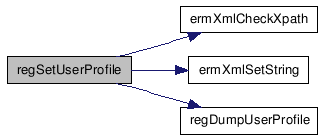
| gboolean regSetUserSetting | ( | const regUserSetting_t * | theUserSetting, | |
| regRegistry_t * | pRegistry | |||
| ) |
Definition at line 591 of file erregxml.c.
00592 { 00593 ERREG_LOGPRINTF("entry %p %p", theUserSetting, pRegistry); 00594 g_assert(theUserSetting); 00595 g_assert(pRegistry); 00596 g_assert(pRegistry->xpaths); 00597 g_assert(pRegistry->xpaths->userSetting); 00598 00599 regDumpUserSetting(theUserSetting); 00600 00601 char xpath[BUF_LEN + 1]; 00602 int nLen, nRet; 00603 gboolean bEnable; 00604 00605 erManifest *pXmlCxt = &(pRegistry->xmlCxt); 00606 00607 // language 00608 if (theUserSetting->language) 00609 { 00610 nLen = g_snprintf(xpath, BUF_LEN, "%s/%s", pRegistry->xpaths->userSetting, EL_LANGUAGE); 00611 nRet = ermXmlCheckXpath(pXmlCxt, xpath); 00612 if (RET_OK == nRet) 00613 { 00614 nRet = ermXmlSetString(pXmlCxt, xpath, theUserSetting->language); 00615 } 00616 if (RET_ERR == nRet) 00617 { 00618 return FALSE; 00619 } 00620 } 00621 00622 // sound 00623 if (theUserSetting->volume) 00624 { 00625 bEnable = TRUE; 00626 } 00627 else 00628 { 00629 bEnable = FALSE; 00630 } 00631 nLen = g_snprintf(xpath, BUF_LEN, "%s/%s/%s", pRegistry->xpaths->userSetting, EL_SOUND, EL_ENABLE); 00632 nRet = ermXmlCheckXpath(pXmlCxt, xpath); 00633 if (RET_OK == nRet) 00634 { 00635 nRet = ermXmlSetBoolean(pXmlCxt, xpath, bEnable); 00636 } 00637 if (RET_ERR == nRet) 00638 { 00639 return FALSE; 00640 } 00641 00642 nLen = g_snprintf(xpath, BUF_LEN, "%s/%s/%s", pRegistry->xpaths->userSetting, EL_SOUND, EL_VOLUME); 00643 nRet = ermXmlCheckXpath(pXmlCxt, xpath); 00644 if (RET_OK == nRet) 00645 { 00646 nRet = ermXmlSetInt(pXmlCxt, xpath, theUserSetting->volume); 00647 } 00648 if (RET_ERR == nRet) 00649 { 00650 return FALSE; 00651 } 00652 00653 // key buffering 00654 if (theUserSetting->keyBuffering) 00655 { 00656 bEnable = TRUE; 00657 } 00658 else 00659 { 00660 bEnable = FALSE; 00661 } 00662 nLen = g_snprintf(xpath, BUF_LEN, "%s/%s/%s", pRegistry->xpaths->userSetting, EL_KEY_BUFFERING, EL_ENABLE); 00663 nRet = ermXmlCheckXpath(pXmlCxt, xpath); 00664 if (RET_OK == nRet) 00665 { 00666 nRet = ermXmlSetBoolean(pXmlCxt, xpath, bEnable); 00667 } 00668 if (RET_ERR == nRet) 00669 { 00670 return FALSE; 00671 } 00672 00673 nLen = g_snprintf(xpath, BUF_LEN, "%s/%s/%s", pRegistry->xpaths->userSetting, 00674 EL_KEY_BUFFERING, EL_NUMBER_OF_KEYS); 00675 nRet = ermXmlCheckXpath(pXmlCxt, xpath); 00676 if (RET_OK == nRet) 00677 { 00678 nRet = ermXmlSetInt(pXmlCxt, xpath, theUserSetting->keyBuffering); 00679 } 00680 if (RET_ERR == nRet) 00681 { 00682 return FALSE; 00683 } 00684 00685 // longkeypresstimeout 00686 nLen = g_snprintf(xpath, BUF_LEN, "%s/%s", pRegistry->xpaths->userSetting, EL_LONG_KP_TIMEOUT); 00687 nRet = ermXmlCheckXpath(pXmlCxt, xpath); 00688 if (RET_OK == nRet) 00689 { 00690 nRet = ermXmlSetInt(pXmlCxt, xpath, theUserSetting->longkeypressTimeout); 00691 } 00692 if (RET_ERR == nRet) 00693 { 00694 return FALSE; 00695 } 00696 00697 // flipbarLeftIsDown 00698 nLen = g_snprintf(xpath, BUF_LEN, "%s/%s", pRegistry->xpaths->userSetting, EL_FLIPBAR_DIRECTION); 00699 nRet = ermXmlCheckXpath(pXmlCxt, xpath); 00700 if (RET_OK == nRet) 00701 { 00702 nRet = ermXmlSetBoolean(pXmlCxt, xpath, theUserSetting->flipbarLeftIsDown); 00703 } 00704 if (RET_ERR == nRet) 00705 { 00706 return FALSE; 00707 } 00708 00709 pRegistry->changed = TRUE; 00710 return TRUE; 00711 }
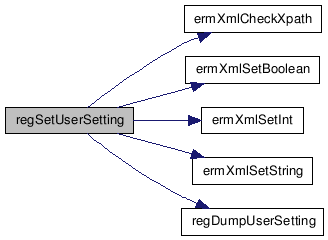
| gboolean regSetVersion | ( | const regVersion_t * | theVersion, | |
| regRegistry_t * | pRegistry | |||
| ) |
Definition at line 289 of file erregxml.c.
00290 { 00291 ERREG_LOGPRINTF("entry %p %p", theVersion, pRegistry); 00292 g_assert(theVersion); 00293 g_assert(pRegistry); 00294 g_assert(pRegistry->xpaths); 00295 g_assert(pRegistry->xpaths->version); 00296 00297 regDumpVersion(theVersion); 00298 00299 if (theVersion->registry) 00300 { 00301 char xpath[BUF_LEN + 1]; 00302 int nLen, nRet; 00303 00304 erManifest *pXmlCxt = &(pRegistry->xmlCxt); 00305 00306 nLen = g_snprintf(xpath, BUF_LEN, "%s/%s", pRegistry->xpaths->version, EL_REGISTRY); 00307 nRet = ermXmlCheckXpath(pXmlCxt, xpath); 00308 if (RET_OK == nRet) 00309 { 00310 nRet = ermXmlSetString(pXmlCxt, xpath, theVersion->registry); 00311 } 00312 if (RET_ERR == nRet) 00313 { 00314 return FALSE; 00315 } 00316 } 00317 00318 pRegistry->changed = TRUE; 00319 return TRUE; 00320 }
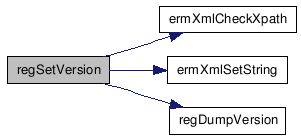
| gboolean regStore | ( | regRegistry_t * | pRegistry, | |
| const char * | szPath | |||
| ) |
Definition at line 166 of file erregxml.c.
00167 { 00168 00169 ERREG_LOGPRINTF("entry: szPath [%s]", szPath); 00170 g_assert(pRegistry); 00171 g_assert(szPath); 00172 00173 gboolean bRet = FALSE; // FALSE = error 00174 int rc; 00175 int n; 00176 char szDirPath[BUF_LEN]; 00177 gchar *szPath_old = g_strdup_printf("%s.old", szPath); 00178 gchar *szPath_new = g_strdup_printf("%s.new", szPath); 00179 00180 // save registry only when it has been changed and validates correctly 00181 if (pRegistry->changed) 00182 { 00183 if ( regValidate(pRegistry) ) 00184 { 00185 // create registry directory when needed 00186 n = readlink(REG_DIR, szDirPath, sizeof(szDirPath)); 00187 if (n > 0 && n < sizeof(szDirPath)) 00188 { 00189 // REG_DIR is a symbolic link -> use the target it points to 00190 szDirPath[n] = '\0'; 00191 } 00192 else 00193 { 00194 snprintf(szDirPath, sizeof(szDirPath), "%s", REG_DIR); 00195 } 00196 // note: ignore error code, probably reports "directory exists" 00197 mkdir(szDirPath, 0755); 00198 00199 // move current file to .old, if any 00200 rename(szPath, szPath_old); 00201 00202 // save to .new 00203 rc = ermXmlSaveAs(&pRegistry->xmlCxt, szPath_new); 00204 if (RET_OK == rc) 00205 { 00206 // saved ok: rename .new to current 00207 rc = rename(szPath_new, szPath); 00208 if (0 == rc) 00209 { 00210 // registry saved alright 00211 pRegistry->changed = FALSE; 00212 bRet = TRUE; // TRUE = ok 00213 } 00214 } 00215 else 00216 { 00217 // save error: discard .new 00218 ERREG_ERRORPRINTF("Registry section [%d] save error [%s]", pRegistry->section, szPath_new); 00219 unlink(szPath_new); 00220 } 00221 } 00222 else 00223 { 00224 ERREG_ERRORPRINTF("Registry section [%d] validation error", pRegistry->section); 00225 } 00226 } 00227 else 00228 { 00229 ERREG_WARNPRINTF("Registry section [%d] not saved because no changes", pRegistry->section); 00230 bRet = TRUE; // TRUE = ok 00231 } 00232 00233 g_free(szPath_new); 00234 g_free(szPath_old); 00235 ERREG_LOGPRINTF("leave: bRet [%d]", bRet); 00236 return bRet; 00237 }

| gboolean regValidate | ( | regRegistry_t * | pRegistry | ) |
Definition at line 53 of file erregxml.c.
00054 { 00055 ERREG_LOGPRINTF("entry"); 00056 g_assert(pRegistry); 00057 g_assert(pRegistry->xmlCxt.pDoc); 00058 00059 gboolean bRet; 00060 00061 bRet = xsdValidateXmlDoc(&pRegistry->xsdCxt, pRegistry->xmlCxt.pDoc); 00062 if (bRet) 00063 { 00064 ERREG_LOGPRINTF("Validation succeeded, filename [%s]", pRegistry->xmlCxt.szFileName); 00065 } 00066 else 00067 { 00068 ERREG_ERRORPRINTF("Validation failed, filename [%s]", pRegistry->xmlCxt.szFileName); 00069 } 00070 00071 return bRet; 00072 }

| static int rmDup | ( | int | arr[], | |
| int * | pSize | |||
| ) | [static] |
Definition at line 1243 of file erregxml.c.
01244 { 01245 int i, tmpArr[*pSize]; 01246 int nLastStored = -1; 01247 int pos = 0; 01248 01249 for (i=0; i<*pSize; i++) 01250 { 01251 if (arr[i] != nLastStored) 01252 { 01253 tmpArr[pos++] = arr[i]; 01254 nLastStored = arr[i]; 01255 } 01256 } 01257 01258 memcpy(arr, tmpArr, sizeof(int)*pos); 01259 return (*pSize = pos); 01260 }
| static gboolean setDialupSettings | ( | regRegistry_t * | pRegistry, | |
| char * | curXpath, | |||
| regDialupSetting_t * | dialupSettings | |||
| ) | [static] |
Definition at line 2855 of file erregxml.c.
02856 { 02857 ERREG_LOGPRINTF("entry %p %s %p", pRegistry, curXpath, dialupSettings); 02858 g_assert(pRegistry); 02859 g_assert(curXpath); 02860 g_assert(dialupSettings); 02861 02862 char xpath[BUF_LEN + 1]; 02863 int nLen, nRet; 02864 02865 erManifest *pXmlCxt = &(pRegistry->xmlCxt); 02866 02867 // phone 02868 nLen = g_snprintf(xpath, BUF_LEN, "%s/%s/%s", curXpath, EL_DIALUP_DETAILS, EL_DIALUP_PHONE); 02869 nRet = ermXmlCheckXpath(pXmlCxt, xpath); 02870 if (RET_OK == nRet) 02871 { 02872 nRet = ermXmlSetString(pXmlCxt, xpath, dialupSettings->phone); 02873 } 02874 if (RET_ERR == nRet) 02875 { 02876 return FALSE; 02877 } 02878 02879 // user 02880 nLen = g_snprintf(xpath, BUF_LEN, "%s/%s/%s", curXpath, EL_DIALUP_DETAILS, EL_DIALUP_USER); 02881 nRet = ermXmlCheckXpath(pXmlCxt, xpath); 02882 if (RET_OK == nRet) 02883 { 02884 nRet = ermXmlSetString(pXmlCxt, xpath, dialupSettings->user); 02885 } 02886 if (RET_ERR == nRet) 02887 { 02888 return FALSE; 02889 } 02890 02891 // password 02892 nLen = g_snprintf(xpath, BUF_LEN, "%s/%s/%s", curXpath, EL_DIALUP_DETAILS, EL_DIALUP_PASSWORD); 02893 nRet = ermXmlCheckXpath(pXmlCxt, xpath); 02894 if (RET_OK == nRet) 02895 { 02896 nRet = ermXmlSetString(pXmlCxt, xpath, dialupSettings->password); 02897 } 02898 if (RET_ERR == nRet) 02899 { 02900 return FALSE; 02901 } 02902 02903 return TRUE; 02904 }

| static gboolean setIpSettings | ( | regRegistry_t * | pRegistry, | |
| char * | curXpath, | |||
| regIpSetting_t * | ipSettings | |||
| ) | [static] |
Definition at line 2946 of file erregxml.c.
02947 { 02948 ERREG_LOGPRINTF("entry %p %s %p", pRegistry, curXpath, ipSettings); 02949 g_assert(pRegistry); 02950 g_assert(curXpath); 02951 g_assert(ipSettings); 02952 02953 char xpath[BUF_LEN + 1]; 02954 int nLen, nRet; 02955 02956 erManifest *pXmlCxt = &(pRegistry->xmlCxt); 02957 02958 // ipaddress 02959 nLen = g_snprintf(xpath, BUF_LEN, "%s/%s/%s", curXpath, EL_IP_STATIC_DETAILS, EL_IP_ADDRESS); 02960 nRet = ermXmlCheckXpath(pXmlCxt, xpath); 02961 if (RET_OK == nRet) 02962 { 02963 nRet = ermXmlSetString(pXmlCxt, xpath, ipSettings->address); 02964 } 02965 if (RET_ERR == nRet) 02966 { 02967 return FALSE; 02968 } 02969 02970 // netmask 02971 nLen = g_snprintf(xpath, BUF_LEN, "%s/%s/%s", curXpath, EL_IP_STATIC_DETAILS, EL_IP_NETMASK); 02972 nRet = ermXmlCheckXpath(pXmlCxt, xpath); 02973 if (RET_OK == nRet) 02974 { 02975 nRet = ermXmlSetString(pXmlCxt, xpath, ipSettings->netmask); 02976 } 02977 if (RET_ERR == nRet) 02978 { 02979 return FALSE; 02980 } 02981 02982 // dns 02983 nLen = g_snprintf(xpath, BUF_LEN, "%s/%s/%s", curXpath, EL_IP_STATIC_DETAILS, EL_IP_DNS); 02984 nRet = ermXmlCheckXpath(pXmlCxt, xpath); 02985 if (RET_OK == nRet) 02986 { 02987 nRet = ermXmlSetString(pXmlCxt, xpath, ipSettings->dns); 02988 } 02989 if (RET_ERR == nRet) 02990 { 02991 return FALSE; 02992 } 02993 02994 // gateway 02995 nLen = g_snprintf(xpath, BUF_LEN, "%s/%s/%s", curXpath, EL_IP_STATIC_DETAILS, EL_IP_GATEWAY); 02996 nRet = ermXmlCheckXpath(pXmlCxt, xpath); 02997 if (RET_OK == nRet) 02998 { 02999 nRet = ermXmlSetString(pXmlCxt, xpath, ipSettings->gateway); 03000 } 03001 if (RET_ERR == nRet) 03002 { 03003 return FALSE; 03004 } 03005 03006 return TRUE; 03007 }

| static gboolean setProxySettings | ( | regRegistry_t * | pRegistry, | |
| char * | curXpath, | |||
| regProxySetting_t * | proxySettings | |||
| ) | [static] |
Definition at line 2907 of file erregxml.c.
02908 { 02909 ERREG_LOGPRINTF("entry %p %s %p", pRegistry, curXpath, proxySettings); 02910 g_assert(pRegistry); 02911 g_assert(curXpath); 02912 g_assert(proxySettings); 02913 02914 char xpath[BUF_LEN + 1]; 02915 int nLen, nRet; 02916 02917 erManifest *pXmlCxt = &(pRegistry->xmlCxt); 02918 02919 // proxyserver 02920 nLen = g_snprintf(xpath, BUF_LEN, "%s/%s/%s", curXpath, EL_PROXY_DETAILS, EL_PROXY_SERVER); 02921 nRet = ermXmlCheckXpath(pXmlCxt, xpath); 02922 if (RET_OK == nRet) 02923 { 02924 nRet = ermXmlSetString(pXmlCxt, xpath, proxySettings->address); 02925 } 02926 if (RET_ERR == nRet) 02927 { 02928 return FALSE; 02929 } 02930 02931 // proxyport 02932 nLen = g_snprintf(xpath, BUF_LEN, "%s/%s/%s", curXpath, EL_PROXY_DETAILS, EL_PROXY_PORT); 02933 nRet = ermXmlCheckXpath(pXmlCxt, xpath); 02934 if (RET_OK == nRet) 02935 { 02936 nRet = ermXmlSetString(pXmlCxt, xpath, proxySettings->port); 02937 } 02938 if (RET_ERR == nRet) 02939 { 02940 return FALSE; 02941 } 02942 02943 return TRUE; 02944 }

| static gboolean setWirelessSettings | ( | regRegistry_t * | pRegistry, | |
| char * | curXpath, | |||
| regWirelessSetting_t * | wirelessSettings | |||
| ) | [static] |
Definition at line 2788 of file erregxml.c.
02789 { 02790 ERREG_LOGPRINTF("entry %p %s %p", pRegistry, curXpath, wirelessSettings); 02791 g_assert(pRegistry); 02792 g_assert(curXpath); 02793 g_assert(wirelessSettings); 02794 02795 char xpath[BUF_LEN + 1], szTmp[BUF_LEN + 1]; 02796 int nLen, nRet; 02797 02798 erManifest *pXmlCxt = &(pRegistry->xmlCxt); 02799 02800 // ssid 02801 nLen = g_snprintf(xpath, BUF_LEN, "%s/%s/%s", curXpath, EL_WLAN_DETAILS, EL_WLAN_SSID); 02802 nRet = ermXmlCheckXpath(pXmlCxt, xpath); 02803 if (RET_OK == nRet) 02804 { 02805 nRet = ermXmlSetString(pXmlCxt, xpath, wirelessSettings->SSID); 02806 } 02807 if (RET_ERR == nRet) 02808 { 02809 return FALSE; 02810 } 02811 02812 // encryption_type_t 02813 regWlanEncrToString(wirelessSettings->encrType, szTmp, BUF_LEN); 02814 nLen = g_snprintf(xpath, BUF_LEN, "%s/%s/%s", curXpath, EL_WLAN_DETAILS, EL_WLAN_ENCRYPTION_TYPE); 02815 nRet = ermXmlCheckXpath(pXmlCxt, xpath); 02816 if (RET_OK == nRet) 02817 { 02818 nRet = ermXmlSetString(pXmlCxt, xpath, szTmp); 02819 } 02820 if (RET_ERR == nRet) 02821 { 02822 return FALSE; 02823 } 02824 02825 // encrKey 02826 if (wirelessSettings->encrType == encr_wep_t || wirelessSettings->encrType == encr_wpa_t) 02827 { 02828 nLen = g_snprintf(xpath, BUF_LEN, "%s/%s/%s", curXpath, EL_WLAN_DETAILS, EL_WLAN_ENCRYPTION_KEY); 02829 nRet = ermXmlCheckXpath(pXmlCxt, xpath); 02830 if (RET_OK == nRet) 02831 { 02832 nRet = ermXmlSetString(pXmlCxt, xpath, wirelessSettings->encrKey); 02833 } 02834 if (RET_ERR == nRet) 02835 { 02836 return FALSE; 02837 } 02838 } 02839 02840 // broadcast 02841 nLen = g_snprintf(xpath, BUF_LEN, "%s/%s/%s", curXpath, EL_WLAN_DETAILS, EL_WLAN_BROADCAST); 02842 nRet = ermXmlCheckXpath(pXmlCxt, xpath); 02843 if (RET_OK == nRet) 02844 { 02845 nRet = ermXmlSetBoolean(pXmlCxt, xpath, wirelessSettings->broadcast); 02846 } 02847 if (RET_ERR == nRet) 02848 { 02849 return FALSE; 02850 } 02851 02852 return TRUE; 02853 }
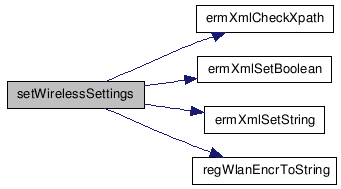
 1.5.6
1.5.6